Items
topic_interest is exactly
interview
-
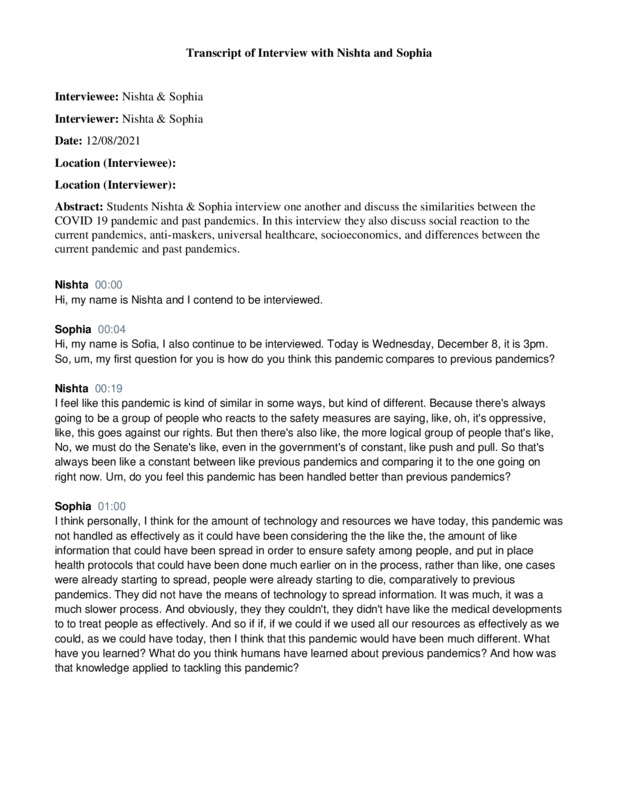 2021-12-08
2021-12-08End of Semester Covid-19 Interview Oral History 2021/12/08
This interview is about our thoughts and understandings of the Covid-19 pandemic after having taken a semester-long course about the history of pandemics spanning from the black plague until the Spanish flu. We've discussed how we think the world could have handled this pandemic differently, the similarities and differences between this pandemic and previous pandemics, and how this pandemic affected our personal lives. -
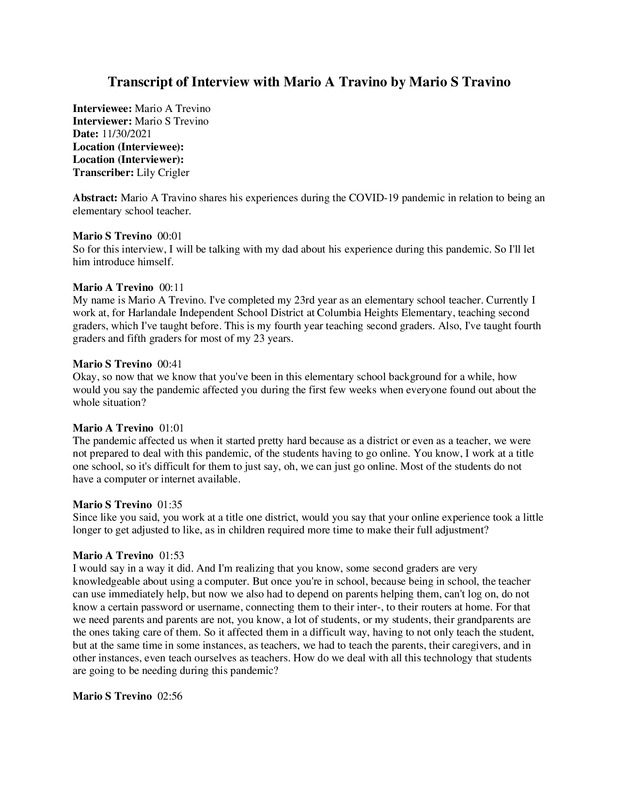 2021-11-30
2021-11-30Mario A Trevino Oral History, 2021/11/30
In order to get a better understanding of the situation in schools during these trying times I felt that we needed to talk to teachers. Getting their side of the story is just as vital as talking with students because in many cases they were just as new to this virtual world as us. So I sat down with my dad who has been a teacher for 20 plus years. I wanted to get his perspective on the situation and talk with him about how teachers felt during this period of transition. -
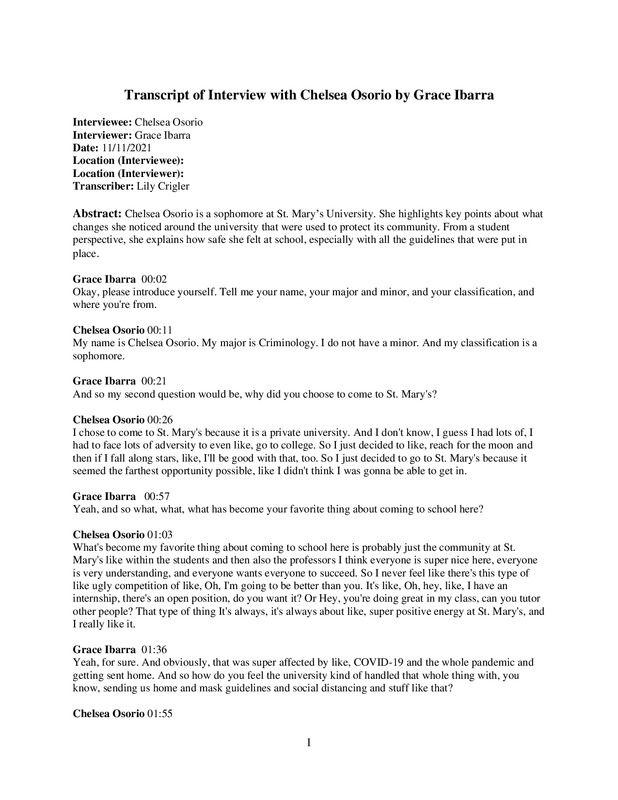 2021-11-11
2021-11-11Commuter Student Perspective on University Changes
Chelsea Osorio is a commuter student at St. Mary’s University and among the many personally affected by the COVID-19 pandemic. In her interview she highlights key points about what changes she noticed around the university that were used to protect our community. From a student perspective, she explains how safe she felt at school, especially with all the guidelines that were put in place. This goes to show how St. Mary’s students, faculty, and staff were committed to ensuring not only a healthy online environment but also making sure we returned to a safe and healthy community. -
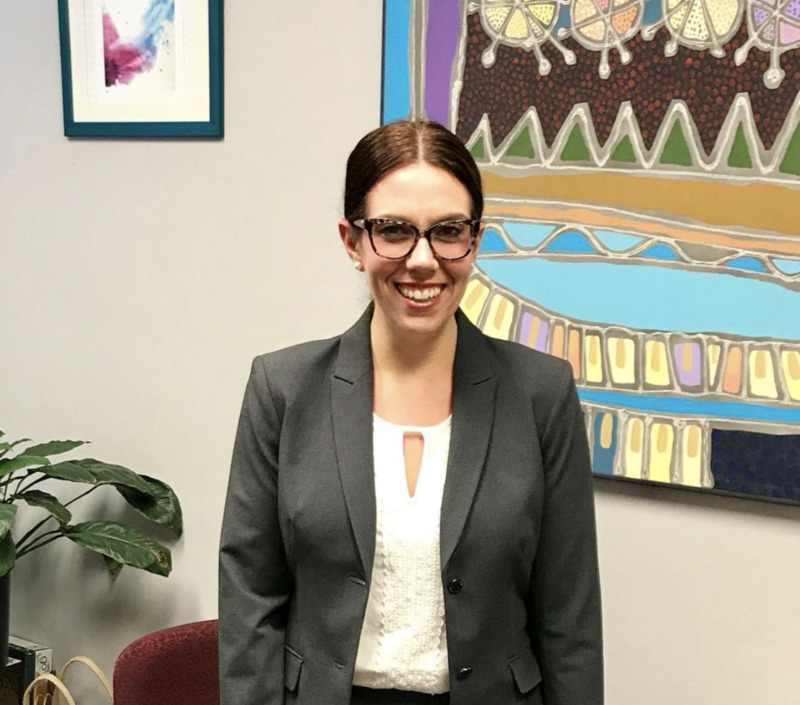 2021-11-03
2021-11-03Oral History: Clare Acosta
Through this oral history, Clare Acosta and I develop a conversation about both the Community Engagement office work and the program of Empower: Ecuador. The conversation was specifically focused on the before and after of COVID-19 and also what was learned from the process. It is a very deep conversation that I really enjoyed and know that Clare also did. -
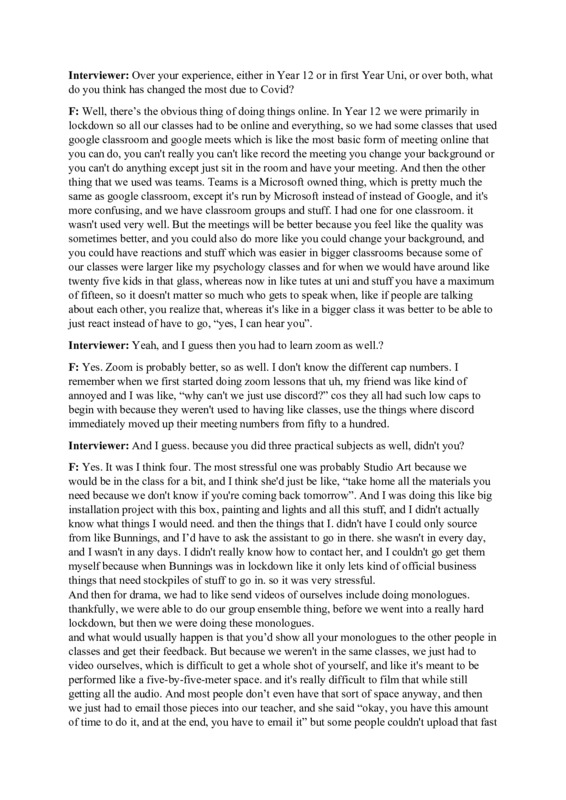 2021-10-15
2021-10-15HIST30060: From Year 12 to First-Year University
I interviewed my younger sibling, 'F', and transcribed the audio. They completed Year 12 in 2020 and then began university in 2021, which I believe is a significant transitionary time especially in the context of Covid to document. Their experiences in using different media forms for online classes is insightful and provides an interesting comparison. Additionally they provide insights into changing interests, socialising online, and reflecting on the world around them. They reflect on how they believe the nature of people has changed in relation to each other in an isolated but connected world, which I believe will be an interesting and informative insight for the future to gain an indepth understanding of the Covd-19 era from the perspective of the youth. -
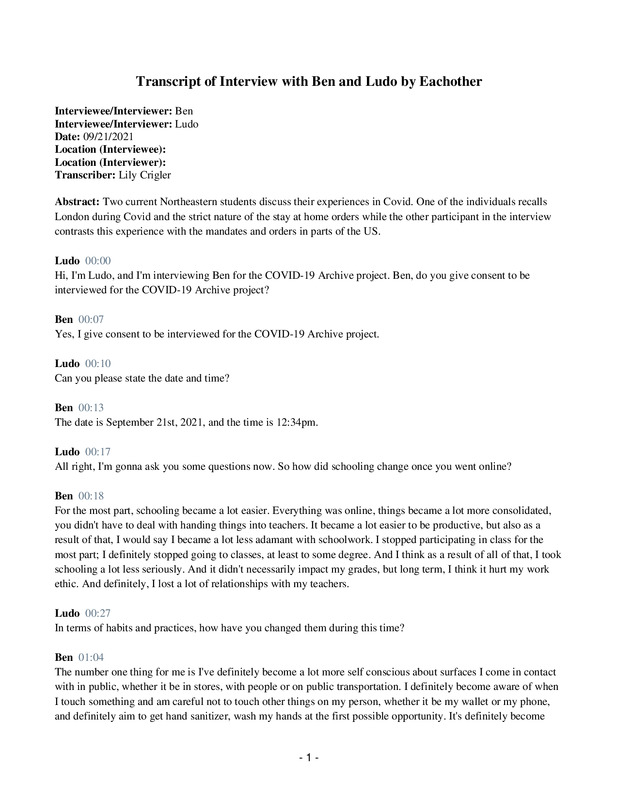 2021-09-21
2021-09-21Ludo and Ben Oral History 09/21/2021
We completed this interview for our History of Global Pandemics class, which we take at Northeastern University. -
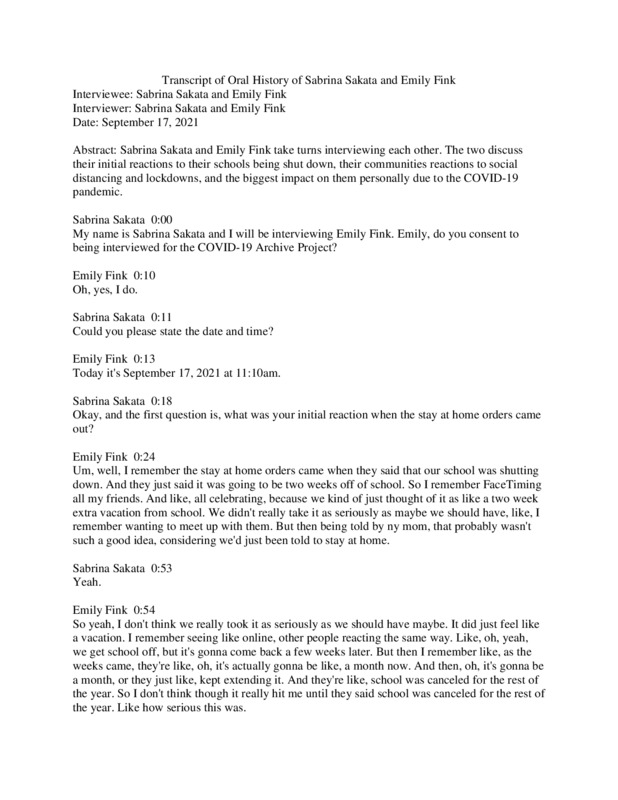 2021-09-17
2021-09-17Sabrina Sakata and Emily Fink Oral History, 2021/09/17
This audio interview shows how my friend, Emily Fink, and I have experienced the pandemic and how it has affected us. -
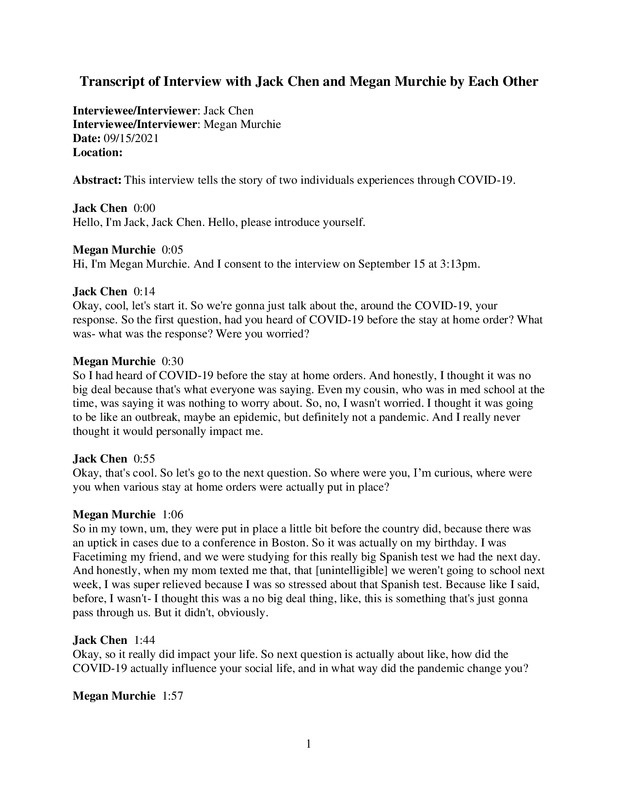 2021-09-15
2021-09-15Jack and Megan; Covid-19 Stories
This podcast tells the story of two individuals experiences through COVID-19. -
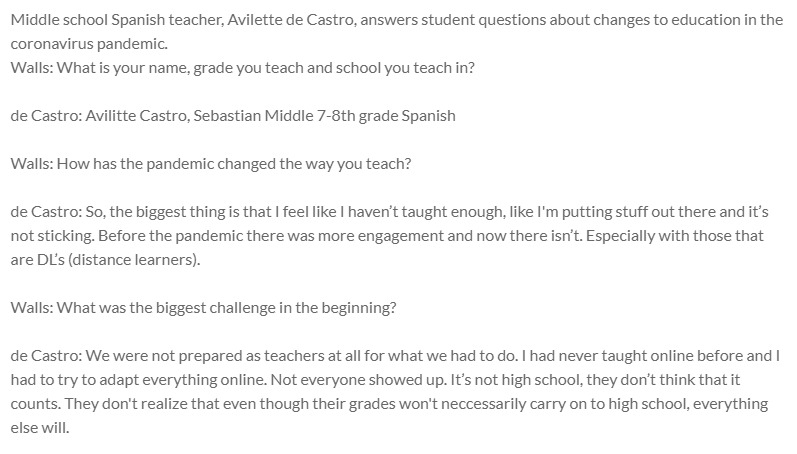 2021-03-16
2021-03-16Teacher Interview: Avilette de Castro
Middle school Spanish teacher, Avilette de Castro, answers student questions about changes to education in the coronavirus pandemic. Walls: What is your name, grade you teach and school you teach in? de Castro: Avilitte Castro, Sebastian Middle 7-8th grade Spanish Walls: How has the pandemic changed the way you teach? de Castro: So, the biggest thing is that I feel like I haven’t taught enough, like I'm putting stuff out there and it’s not sticking. Before the pandemic there was more engagement and now there isn’t. Especially with those that are DL’s (distance learners). Walls: What was the biggest challenge in the beginning? de Castro: We were not prepared as teachers at all for what we had to do. I had never taught online before and I had to try to adapt everything online. Not everyone showed up. It’s not high school, they don’t think that it counts. They don't realize that even though their grades won't neccessarily carry on to high school, everything else will. Walls: What is the biggest challenge now? de Castro: So now, it’s mostly back to normal in some senses. We haven’t had any kids go into quarantine in awhile and I’m down to only 3 DL’s and I don't know if the kids are fully into it. I always have the thought that we could go back into quarantine. We just adopted a new textbook and I have to tell that book as well. The EOC (End of Course Exam) for this year is being used from this new book. I am adapting everything, but not able to get a hold of everything. I am learning this new book as well as my students. Walls: How do you think students are doing? What are their biggest challenges? de Castro: I don’t think, for me, I really don’t think I’ve taught them as well as I normally do. I hate to say this because it’s not quite bad. Some of my students aren’t doing anything, because they don’t think it will count. The other thing for me, I do a language class. A big part of my class is conversation. I don’t let them work in groups and they aren’t able to get the conversation that they used to get. Right now we are doing a food unit. They don’t get the reaction in conversations. Walls: Do you see anything beneficial coming from the changes you have had to implement? de Castro: Oh yeah. For me, doing stuff with technology has always been supplemental instead of part of the curriculum. Like if I post this you can have it and now everything is online. The kids have access to it online, doesn’t mean the students use the extra resources. I’ve been having to use the textbook website and it’s something that they can do anywhere that they are at. It’s an added resource, so it's a benefit for them. Walls: How has parent involvement changed during the pandemic? de Castro: No, one of my DL’s has his guardian sister with him the whole time and it’s a little nerve racking to have her hear me the whole time. It’s pretty much the same overall. -
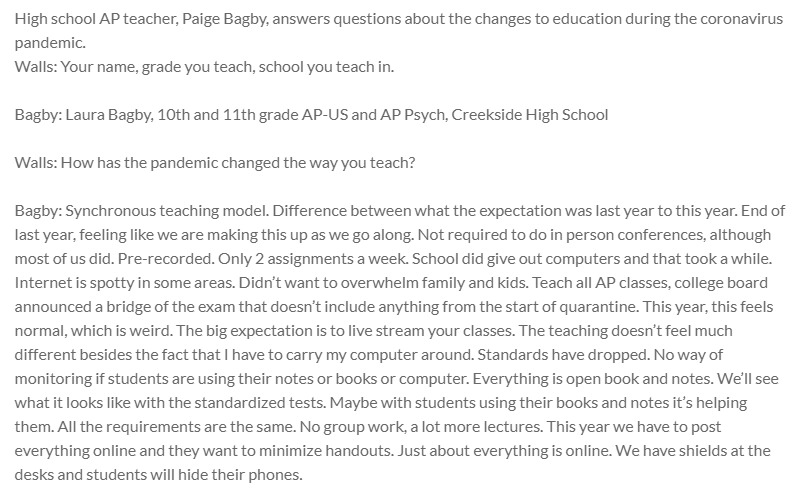 2021-04-01
2021-04-01Teacher Interview: Paige Bagby
High school AP teacher, Paige Bagby, answers questions about the changes to education during the coronavirus pandemic. Walls: Your name, grade you teach, school you teach in. Bagby: Laura Bagby, 10th and 11th grade AP-US and AP Psych, Creekside High School Walls: How has the pandemic changed the way you teach? Bagby: Synchronous teaching model. Difference between what the expectation was last year to this year. End of last year, feeling like we are making this up as we go along. Not required to do in person conferences, although most of us did. Pre-recorded. Only 2 assignments a week. School did give out computers and that took a while. Internet is spotty in some areas. Didn’t want to overwhelm family and kids. Teach all AP classes, college board announced a bridge of the exam that doesn’t include anything from the start of quarantine. This year, this feels normal, which is weird. The big expectation is to live stream your classes. The teaching doesn’t feel much different besides the fact that I have to carry my computer around. Standards have dropped. No way of monitoring if students are using their notes or books or computer. Everything is open book and notes. We’ll see what it looks like with the standardized tests. Maybe with students using their books and notes it’s helping them. All the requirements are the same. No group work, a lot more lectures. This year we have to post everything online and they want to minimize handouts. Just about everything is online. We have shields at the desks and students will hide their phones. Walls: What was the biggest challenge in the beginning? Bagby: The biggest challenge in the beginning was convincing everybody that school was still happening. I had some students drop off the face of the earth for the first couple of weeks. I had a rumor that some students weren’t doing work because they thought none of the work counted. Some showed up to the conference but didn’t do work and some didn’t show up or do work. You never really know if your distance learners are there. You’ll see their name but you can’t actually see them. I’ll look and see that a distance learner hasn’t started their quiz yet, because they aren’t at their computer. I will say I have some distance learners who are doing the absolute best. Walls: What is the biggest challenge now? Bagby: The buy in. Getting students to understand that this is still school and that they still have to do the work. Walls: How do you think students are doing? What are their biggest challenges? Bagby: I think that it all depends on the individual student. Some students are looking at this pandemic like it’s a big joke. I’ll overhear conversations where they talk about getting Covid so they can have two weeks off. Some of them aren’t taking it seriously at all. I have a student whose father died and parents who’ve lost their jobs and multiple students whose parents have separated or divorced from the pressures that this puts on the relationship. It really depends on their home situation. There are students that are really struggling, but I guess thats true every year. On the whole the grades are good, but there is an individual case of the student. It takes what you see throughout the whole year amplified. Normally APUSH is difficult and some students are making solid A’s, it isn’t a bad thing. Walls: Do you see anything beneficial coming from the changes you have had to implement? Bagby: I would say that it’s been a real exercise in communication. I think that; for instance, for older teachers who refused to use technology have really stepped it up. I think a lot of them are tired too. The idea of being flexible and embracing something new. If I've learned anything at all from teaching in the pandemic, it is flexibility. Be flexible. I’ve had to learn to let go. I don’t know. I’ve always heard the argument that technology is going to replace teachers. I hope that people have grown a new respect for teachers. I feel like most parents around the country have learned that their child learns better in the classroom and not online. We still need classrooms. Walls: Are you noticing a change in parent involvement? Bagby: My parents, by the way, have been wonderful this year. I have this one family, their son is distance learning and each quarter they send an email to the teachers thanking them and they give us presents. -
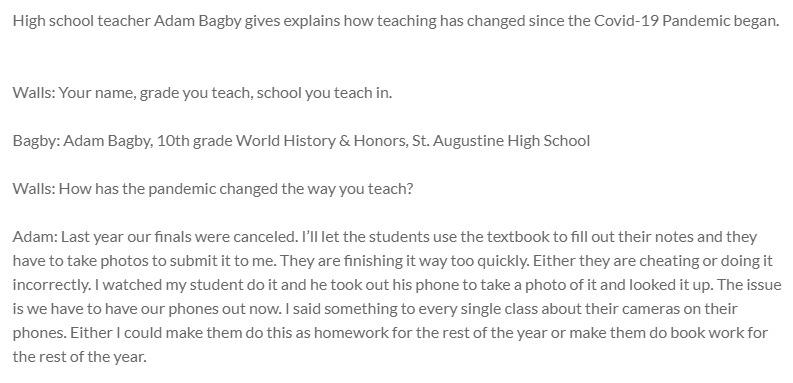 2021-04
2021-04Teacher Interview: Adam Bagby
High school teacher Adam Bagby gives explains how teaching has changed since the Covid-19 Pandemic began. Walls: Your name, grade you teach, school you teach in. Bagby: Adam Bagby, 10th grade World History & Honors, St. Augustine High School Walls: How has the pandemic changed the way you teach? Adam: Last year our finals were canceled. I’ll let the students use the textbook to fill out their notes and they have to take photos to submit it to me. They are finishing it way too quickly. Either they are cheating or doing it incorrectly. I watched my student do it and he took out his phone to take a photo of it and looked it up. The issue is we have to have our phones out now. I said something to every single class about their cameras on their phones. Either I could make them do this as homework for the rest of the year or make them do book work for the rest of the year. Walls: What was the biggest challenge in the beginning of the pandemic when classes were remote? Bagby: The exact same challenge from beginning to now that is not solvable. Students will log in and during our instruction I’ll call on a student and they wouldn’t be on the computer. I would mark them absent. I would get parent phone calls and emails. Walls: What is the biggest challenge now? Bagby: The buy in for students from home. I’ll even tell my students to text their friends Walls: How do you think students are doing? What are their biggest challenges? Bagby: My issue is for my students to remember turning in their work online. Some are doing worse because they aren’t able to hand in an assignment. I had some students who enrolled online, but they are working during the day to help their families out with bills. It seems like there’s a lot more stress than there should be. There are some students who have the discipline who can sit down at the computer and do the work, but some students can’t do that at all. I have 2 students I have not seen at all. It’s a blessing and a curse. You can do well with it or not. It all depends on your home situation. Walls: Do you see anything beneficial coming from the changes you have had to implement? Bagby: I saw this happening last year, so I put everything online early. I’ve been teaching for 7 years, so I always knew how important technology is in education. I think online integration is going to be permanent, like Schoology. There obviously needs to be a better platform. Walls: Are you noticing a change in parent involvement? Bagby: Oh yeah. They’re not there. I haven’t had any complaints. Most parents have been understanding. -
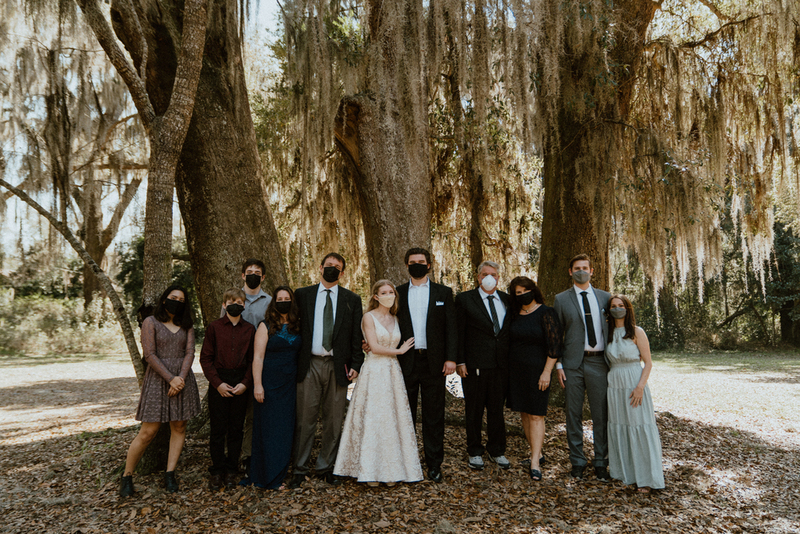 2021-03
2021-03Pandemic Wedding: Jon and Brittany Wolf
Walls- What things did you have to change for your wedding to happen? (i.e. limit the number of people, venue changes to outside venues, or making face masks required) Wolf-We never really wanted a big wedding so making it as small as possible due to the current world climate was something that we were more than happy to do. We had to limit the guests to only immediate family even though our original intentions were to have more people present; we just didn’t feel right having any bigger of a ceremony. Our ceremony was also outdoors so our family groups could social distance more effectively and we made face masks mandatory at all times. Walls- What was the biggest concern you had about having your wedding during a global pandemic? Wolf- It was the fact that we could not include many people that we know would have loved to have been there. Our decision to limit to only immediate family was a tough one, but the one we felt most comfortable with. We were worried that some people may have been hurt by this decision. That turned out to not be the case, we were not selective with our invites and instead only invited immediate family. Walls- Did you have any reservations about having your wedding at all? Did you have to push back your wedding? Wolf- Not really. It was pretty low-key so we were not worried about spreading the virus. We had reservations when we originally planned a larger ceremony which is why we decided to change it. Walls- What issues, if any, did you have with the vendors that you had scheduled for your wedding? Wolf- We didn’t have any vendors! :) Walls- If you had to push your wedding back, were vendors really flexible on giving you a new date/ refund? Wolf- Same answer as above. Walls- What does it feel like to have gotten married during a pandemic? Wolf- Surreal. It is amazing to have some sense of normalcy during this absurdly crazy time. The accommodations we had to make were things we never even considered before the pandemic hit. It is definitely a story we will look back on fondly! -
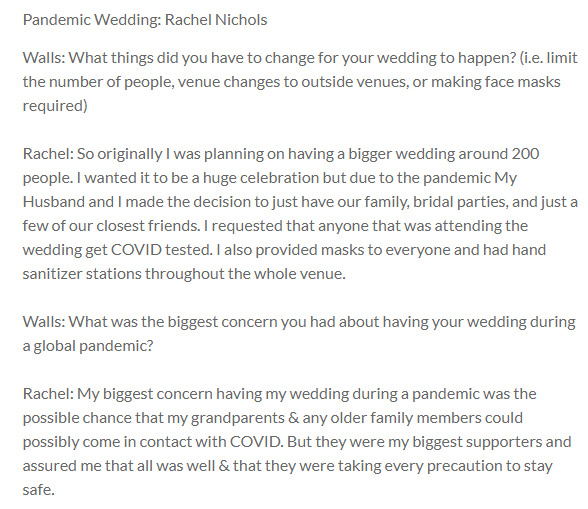 2021-03
2021-03Pandemic Wedding: Rachel Nichols
Walls: What things did you have to change for your wedding to happen? (i.e. limit the number of people, venue changes to outside venues, or making face masks required) Rachel: So originally I was planning on having a bigger wedding around 200 people. I wanted it to be a huge celebration but due to the pandemic My Husband and I made the decision to just have our family, bridal parties, and just a few of our closest friends. I requested that anyone that was attending the wedding get COVID tested. I also provided masks to everyone and had hand sanitizer stations throughout the whole venue. Walls: What was the biggest concern you had about having your wedding during a global pandemic? Rachel: My biggest concern having my wedding during a pandemic was the possible chance that my grandparents & any older family members could possibly come in contact with COVID. But they were my biggest supporters and assured me that all was well & that they were taking every precaution to stay safe. Walls: Did you have any reservations about having your wedding at all? Rachel: I definitely had reservations about having my wedding, for weeks I went back and forth on whether it was the right decision. It was honestly mentally wearing but I wouldn’t change a thing. My wedding was uniquely perfect and I had everyone there that I needed. Walls: Did you have to push back your wedding? Rachel: I definitely had push back from a few family members about having my wedding, it was a really hard decision to make. But eventually they came around. My wedding date was significant to me because I discovered that my Grandfather had gotten married on the same date I chose. It meant too much to me to change. Walls: What issues, if any, did you have with the vendors that you had scheduled for your wedding? Rachel: I actually had zero issues with the Vendors because all I needed was a bartender, the caterer was more than accommodating and I had a family friend be my photographer. Everything was smooth sailing. Walls: If you had to push your wedding back, were vendors really flexible on giving you a new date/ refund? Rachel: Everyone who helped make this wedding possible was very flexible, they understood the circumstances at hand. Walls: What does it feel like to have gotten married during a pandemic? Rachel: Getting married during a pandemic was interesting, before the wedding I was nervous. I didn’t want anybody to feel uncomfortable, that was my biggest worry. But as soon as the ball got rolling everything felt effortless and magical. It became a very carefree environment where everyone who was there was able to forget about what was happening in our world and just enjoy themselves. Like I said before I wouldn’t have changed a thing, it didn’t even feel like we were in a pandemic. Everyone was able to enjoy themselves and stay safe at the same time. I'm very blessed to have been able to get married during a pandemic. It’s unique and something I will be able to tell my children about one day. These memories I will hold dear to my heart forever. It was just the right people and it couldn’t have been better. -
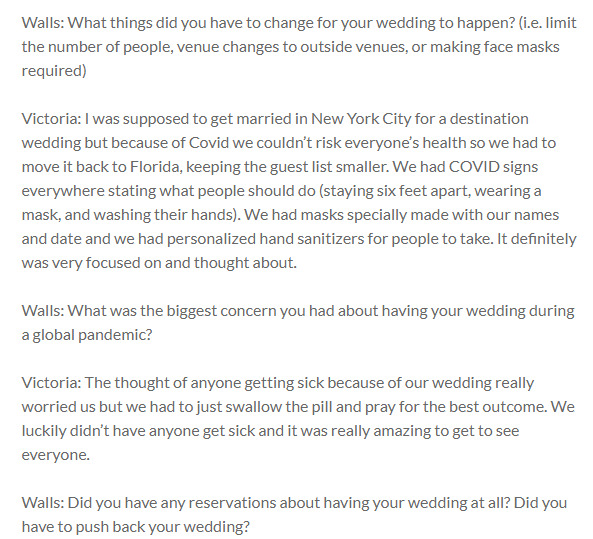 2021-03
2021-03Pandemic Wedding: Victoria Beasley
Walls: What things did you have to change for your wedding to happen? (i.e. limit the number of people, venue changes to outside venues, or making face masks required) Victoria: I was supposed to get married in New York City for a destination wedding but because of Covid we couldn’t risk everyone’s health so we had to move it back to Florida, keeping the guest list smaller. We had COVID signs everywhere stating what people should do (staying six feet apart, wearing a mask, and washing their hands). We had masks specially made with our names and date and we had personalized hand sanitizers for people to take. It definitely was very focused on and thought about. Walls: What was the biggest concern you had about having your wedding during a global pandemic? Victoria: The thought of anyone getting sick because of our wedding really worried us but we had to just swallow the pill and pray for the best outcome. We luckily didn’t have anyone get sick and it was really amazing to get to see everyone. Walls: Did you have any reservations about having your wedding at all? Did you have to push back your wedding? Victoria: We tossed around the idea of pushing it back but after really thinking about it we decided not to because we had no idea when Covid would be over so it just didn’t really make any sense. Walls: What issues, if any, did you have with the vendors that you had scheduled for your wedding? Victoria: We didn’t really have any issues with vendors. Walls: If you had to push your wedding back, were vendors really flexible on giving you a new date/ refund? Victoria: Our photographer specifically was super understanding, he was going to go to New York with us and was completely understanding and okay with us possibly changing the date when we were tossing around the idea of changing the date and he was okay with us staying in Florida no extra charge, I think he just wanted us to feel comfortable given the circumstances. Walls: What does it feel like to have gotten married during a pandemic? Victoria: If anything it gave us a sense of relief, nobody got sick and like a feeling of reassurance that just because there is a pandemic, while yes keeping it safe, we could continue to live our lives. It’s also cool to think that we can one day tell our grandkids how we got married during a pandemic. -
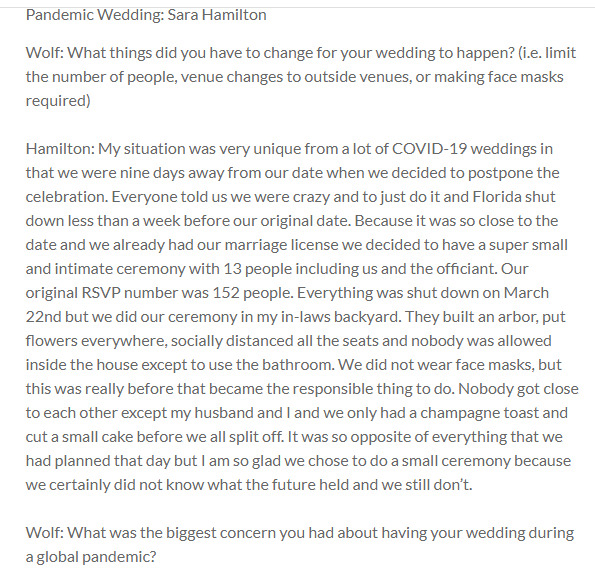 2021-03
2021-03Pandemic Wedding: Sara Hamilton
Wolf: What things did you have to change for your wedding to happen? (i.e. limit the number of people, venue changes to outside venues, or making face masks required) Hamilton: My situation was very unique from a lot of COVID-19 weddings in that we were nine days away from our date when we decided to postpone the celebration. Everyone told us we were crazy and to just do it and Florida shut down less than a week before our original date. Because it was so close to the date and we already had our marriage license we decided to have a super small and intimate ceremony with 13 people including us and the officiant. Our original RSVP number was 152 people. Everything was shut down on March 22nd but we did our ceremony in my in-laws backyard. They built an arbor, put flowers everywhere, socially distanced all the seats and nobody was allowed inside the house except to use the bathroom. We did not wear face masks, but this was really before that became the responsible thing to do. Nobody got close to each other except my husband and I and we only had a champagne toast and cut a small cake before we all split off. It was so opposite of everything that we had planned that day but I am so glad we chose to do a small ceremony because we certainly did not know what the future held and we still don’t. Wolf: What was the biggest concern you had about having your wedding during a global pandemic? Hamiton: For us the biggest concern was travel and people not being able to get back home amidst the beginning of the pandemic panic. We also have a lot of older people attending and we could never forgive ourselves if anyone we loved became sick because of coming to our wedding. And as I so think we are allowed to be selfish about one thing, another concern was that it just wouldn’t be the dance party we envisioned. We are both relatively relaxed and wanted to have the “big party” without people worrying for their own safety. For these reasons, we still have not had our big wedding. Wolf: Did you have any reservations about having your wedding at all? Did you have to push back your wedding? Hamilton: We had so many reservations. How could we be selfish and have the wedding no matter what when there is a global pandemic going on? Millions of people have died, and we want to celebrate our love even if it means not having those that have supported us in our partnership throughout the years? It just did not feel right to either of us. Our dream wedding is not about all the expensive and luxurious things… it is about having the support system that has been there for us throughout the years. Without that, it is not the wedding that we want. It has been extremely devastating, but we try to remember WHY we have made these decisions. I am tearing up as I think about it. Yes, we have now pushed back our wedding three times. We had an original date of March 22nd, 2020 and on March 17th, 2020 we chose October 18th, 2020 to be our second date. In August of 2020, we decided to postpone our October date to March 21st, 2021. We were confident we could safely make it happen but come January with reservations from both of us and our families, we decided to indefinitely postpone the big celebration until the world feels safe enough. Come July 2021, we will sit down to discuss if we will move forward with a fall/winter date or if we will push back to 2022. Wolf: What issues, if any, did you have with the vendors that you had scheduled for your wedding? Hamilton: We are incredibly blessed and have had minimal issues with all our vendors. We chose to support local for all of our vendors and everyone that we picked is people that we personally know. Most people cannot say the same as us, especially after postponing three times. We only “lost” one deposit from our DJ but he is giving us a discount when we do rebook. We had to pay an extra couple of thousand for our venue (The Riverhouse) as our contract was only for 2020 and we had gotten a generous discount, but they were so gracious to us and all of the money we have put forward is being saved on an invoice for whatever date we end up choosing, regardless of if its in 2021 or 2022. So basically, all of vendors saved our money and will apply it to our new date when that time comes. This is very fortunate and we do not take that for granted, by any means. Our wedding was paid in full so with our vendors being so flexible with time and money, its taken a lot of stress of our shoulders and has made postponing multiple times a lot easier because we don’t feel pressured to move forth due to time and money. If it did not go this way for us, I’m not sure what we would’ve done…weddings are expensive. Wolf: If you had to push your wedding back, were vendors really flexible on giving you a new date/refund? Hamilton: The first time around everyone was incredibly flexible and actually gave us first dibs on a new date since we were only nine days away from the big day when we decided to postpone. Second postponement wasn’t as easy but everyone still stayed flexible. Upon our third postponement, we were worried we would get backlash at saving a date then cancelling which is why we decided to postpone indefinitely until we feel its safe so we aren’t taking a date away from another couple and not stopping our vendors from making money on that day, since we are fully paid. We aren’t sure what will happen when we do choose a new date as that will require signing new contracts but because everyone has been so flexible and generous to us, we have no problem paying extra money for every vendor we chose. We chose each vendor because we really liked their work but we will stay with all of them for how they have treated us. We will pick a date that works for them all because they have done so much to keep us comfortable and we couldn’t imagine our day without them being by our side. We have not asked for any refunds nor will we. Wolf: What does it feel like to have gotten married during a pandemic? Hamilton: I could come up with a lot of adjectives to describe how it has felt as we are closing in on almost a year since our “mini mony” as they now call it. It is overwhelming, devastating, beautiful, and happy. (Here I am crying again) On March 13th, as I stood in my wedding dress for my final dress fitting, I cried with my mother-in-law as we were receiving calls, emails, and texts left and right about people not being able to make it due to the arising concern. It was there that we both knew what was needed. We drove home and broke the news to my husband and asked him how he felt. He agreed but didn’t say much. His mother left and we cried. We cried hard; we were SO mad. How could this happen SO close to our dream wedding? It took a few days, but we accepted it and decided to do the small ceremony anyways and wear what we had planned to wear. It was the happiest day of our lives, regardless of what had happened prior to 5:00 pm on March 22nd, 2020. So, while its been one of the hardest and disappointing things we have had to go through, it has made our marriage strong, honest, loyal, and committed. If we can get through our first year of marriage during a global pandemic postponing our wedding three times, I think we can do most things. I got to marry my best friend and the love of my life and I would be so disappointed in myself now if we had let postponing the wedding stop us from getting married. The big party will happen one day and this has taught us one very important life lesson: patience. So while I don’t wish this circumstance on anyone and so many have gone through it, I don’t regret that I got married during a pandemic. What a story for the kids one day, eh? -
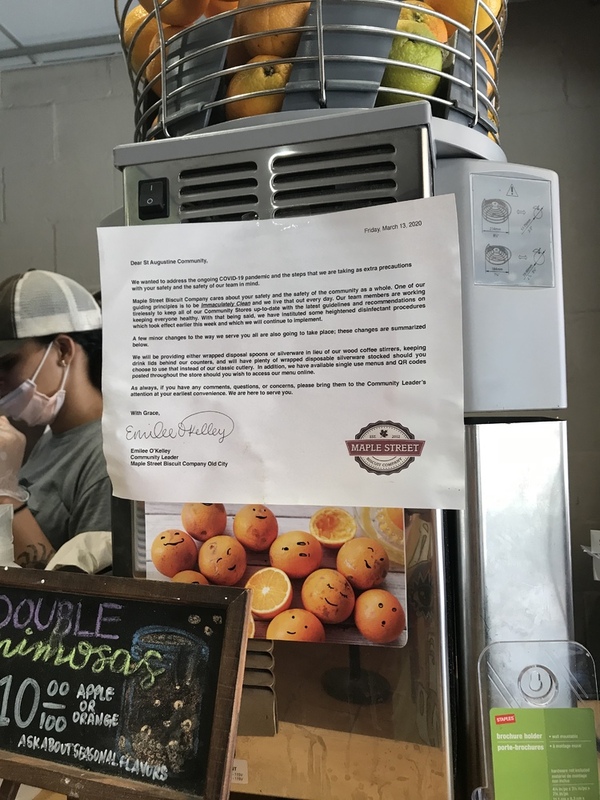 2020-06-15
2020-06-15Maple Street Biscuit Co.
Maple Street Biscuit Co restaurant located in downtown Saint Augustine, FL. Several signs posted on the front doors read: "Dear Guests, Your safety is our top priority. If you have any of the following symptoms, we ask that you do not enter: Fever, Cough." Another sign read: "We ask you please wear a face mask upon entering our community store." A sign that sits on the counter by the register read: "Out of respect for other guests and our team, please do not reach behind our counter." Brief interview with Community Leader (Store Manager) Emilee O'Kelley: What Plan did you come up with to ensure the safety of your guests and employees? It is actually not my plan. The plan was implemented by corporate and distributed to all locations. In the beginning of lockdown, we tried to do as much to ensure that we could keep our stores up and running. First, we shut down our dining rooms. We made everything to go and third-party delivery. We went down to a limited menu. And we opened a community store where people could buy pasta, toilet paper, hand sanitizer, soap, paper towels and produce to ensure that our community was taken care of as well. Right now our dining room is back open to 50 percent capacity in compliance with Florida guidelines. All of the tables are 6 feet away from each other and were taking extra precautions by making sure all of team members are wearing masks. We offer guests plastic cutlery. We stopped operating self-serve stations and now a team member assists guests. Do your employees currently receive hazard pay? No How has your business operations or income changed since COVID and quarantine? Income definitely. We were used to doing $2000-dollar weekdays and $6000-dollar weekends and during quarantine we were only making max 600 dollars a day. With the travel ban lifted we have slowly gotten back to normal operations, but it is still not the same. Did you implement curbside takeout? How did that transition go? We did not advertise curbside takeout, but if they called and asked us to bring it out to their car, we would. We mostly shifted in a way to make our guests as comfortable as possible while following our corporate guidelines. Have you had any issues with customers since the implementation of new guidelines, specifically the mask mandate? No, because our store does not strictly require a mask mandate. We politely ask that our customers wear a mask, but they will not refuse service. Are your employees allowed to ask customers to wear a mask? No -
 2020-07-14
2020-07-14EarthBound Store
Earthbound, located on Saint George Street in Saint Augustine, FL displayed several signs throughout their store. Outside they had signs that read: “Wearing a face mask is required for both your protection and ours.” And “To help us follow CDC guidelines, we're limiting the multiple entry points to this location. We are requesting only 15 people to occupy this store at a time.” Signs were also displayed in the store encouraging visitors to maintain a 6-foot distance from all other customers. Interview with crew member Bryce: What plan was created to ensure the safety of your guests? Our store was briefly closed during quarantine, since we were not considered an essential business. During reopening we all went through training to start sanitizing all of our areas that people would touch in the store. Do your employees currently receive hazard pay? No How has your business changed since COVID? We are limiting how many people can enter the store at a time, other than that nothing has changed that much. If you are a restaurant did you implement take out or curbside, and how did that go? We are not a restaurant. What steps did you have to take in order to comply with local and federal government orders? All of out crew members and customers have to wear masks. We are required to limit how many people enter our store, since it is small. We are not allowed to have any testers out for things such as makeup. -
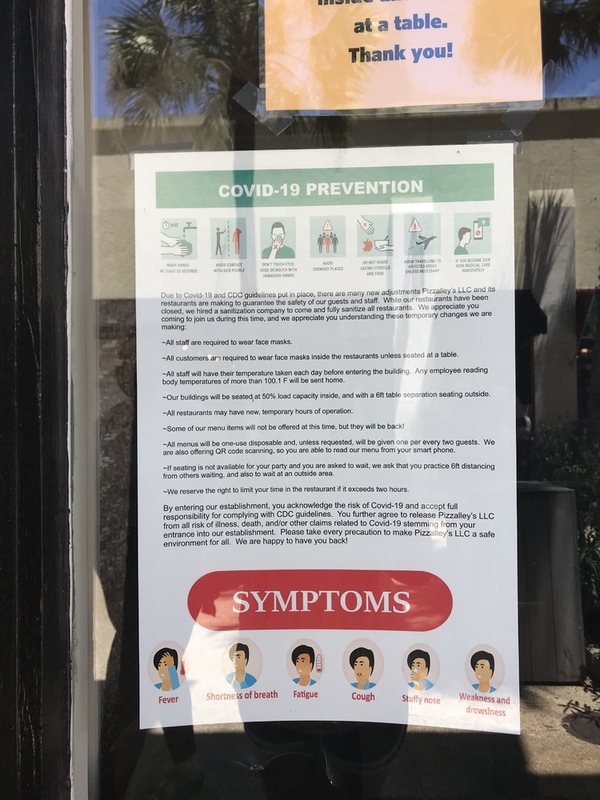 2020-07-29
2020-07-29Prohibition Kitchen and Roosevelt Room
Prohibition Kitchen and Roosevelt room located on Saint George Street in Saint Augustine, FL had several signs in bright orange to grab ' attention. The most extensive was a sign (pictured) detailing how to prevent the spread of Covid-19 and the symptoms. Other signs stated that guests were required to wear a face mask upon entering, and stated that seating would be limited due to the new social distancing guidelines provided by the state. They also provided a barcode to scan and read a digital menu on your phone. Interview transcription with manager Charles: What plan was created to ensure the safety of your guests? Our restaurant currently is operating at 50 percent capacity. During quarantine we closed the restaurant and stayed closed until Florida had moved into phase two of reopening. All of our tables are frequently sanitized, and our servers are required to wear masks. When they start their shift, they are required to answer questions about their health or any symptoms they may be experiencing. Do your employees currently receive hazard pay? No How has your business changed since COVID? We operate slightly differently now. We have to be more careful and we are not able to accommodate as many guests. If you are a restaurant did you implement take out or curbside, and how did that go? No, the restaurant was closed and there was no way to do any kind of curbside takeout. What steps did you have to take in order to comply with local and federal government orders? We have all of our guests and servers wear masks. If a guest enters without a mask they are asked to leave. We have several signs on our door that state that. All of our table are either six feet apart or we only seat guests at every other table. Our bar is currently closed, but we still have live music for the dinner guests. -
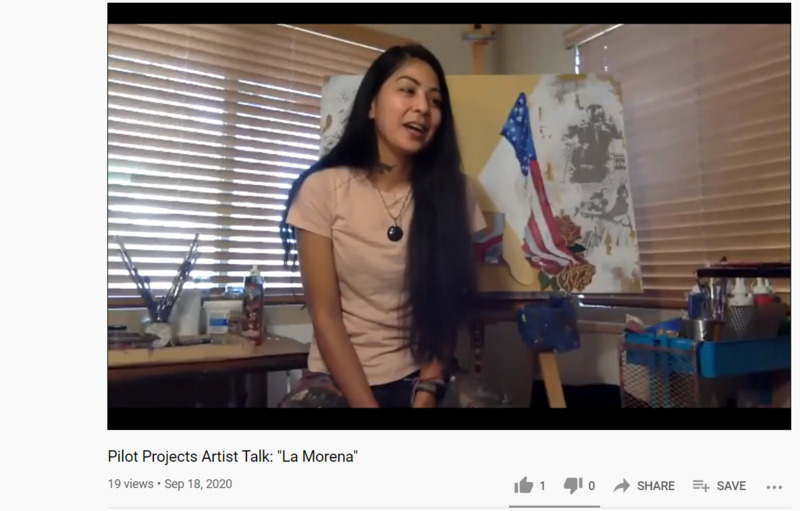 2020-09-18
2020-09-18Pilot Projects Artist Talk: "La Morena"
Pilot Projects Artist Talk: "La Morena" is a conversation with Arizona-based muralist and painter Lucinda Yrene Hinojos and director Pita Juarez about the short film “La Morena,” on view Sept. 15–19, 2020 as part of Pilot Projects: Art. Response. Now. Lucinda talks about the process behind her murals, art and activism, and what she is working on next. The short film “La Morena” features Arizona artist, Lucinda Yrene Hinojos, who is claiming her roots and activism through her art. She brings all her love, inspiration and pain into creating murals with the guidance of her ancestors who energize her art. The result is a mural that focuses on the power of community, family and healing. This film was produced in association with Mango Skies and Poder in Action. To learn more about La Morena, check out: https://lamorenaart.com/ ***They discuss art during the pandemic, police brutality, social justice, how Covid-19 has affected their art. -
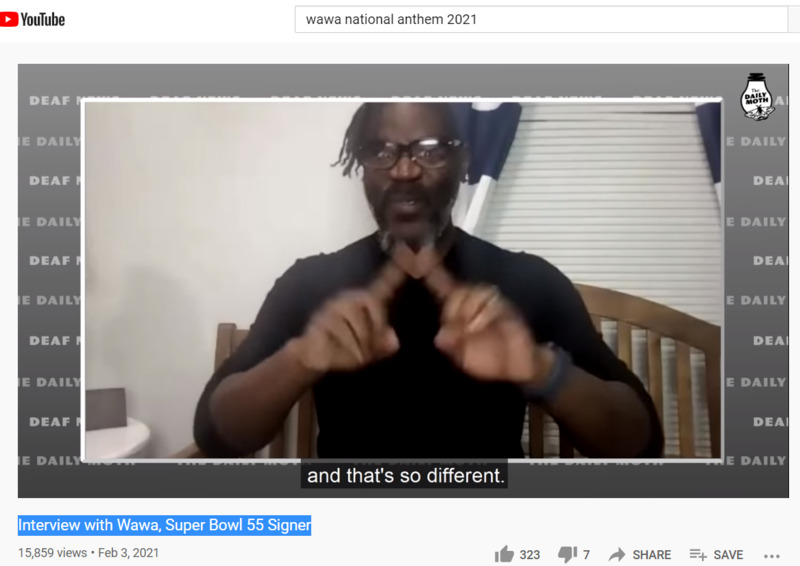 2021-02-03
2021-02-03Interview with Wawa, Super Bowl 55 Signer
Interview with Warren "Wawa" Snipe about his gig with Super Bowl 55 this Sunday. We also discuss his new album, “Wamilton,” and his genre of Dip Hop. -
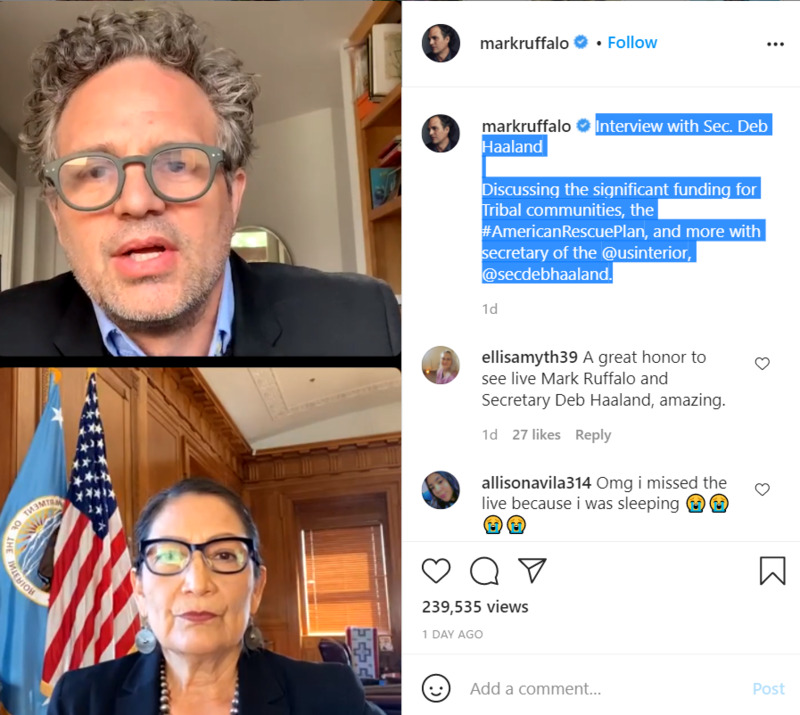 2021-04-02
2021-04-02Mark Ruffalo Interviews Sec. Deb Haaland
Mark Ruffalo interviews Sec. Deb Haaland about climate change, Pipeline 3, Biden administration, pandemic, tribal affairs, and Deb Haaland's rise in politics. -
 2021-03-21
2021-03-21Oral History: Interview with Anonymous Peace Officer #2
James Rayroux 0:01 My name is James Rayroux, and I'm a graduate student in global history at Arizona State University, and I'm working as a curation intern with the "Journal of the Plague Year" COVID-19 archive. Today is March 21, 2021, and it's just after 8:12pm or 2012 hours here in Arizona. I'm speaking with a narrator who wishes to contribute to the COVID-19, archive anonymously. Sir, I first want to thank you for speaking with me and contributing to this COVID-19 archive. Do you consent to having this interview recorded, transcribed, and immediately posted to the "Journal of the Plague Year" COVID-19 archive, where it will be made accessible to the public? Anonymous Officer 0:43 Yes, I do. JR 0:44 Thank you again for agreeing to speak with me and making time for this interview. In lieu of your name, or location, can you provide a summary of your background and professional experience in law enforcement? AO 1:01 Sure, I've been sworn law enforcement for almost 23 years in a state in the Rocky Mountain region. I've worked both for municipal and state government, and I work for small to medium sized agency now about 35 sworn officers. I'm a military veteran, I was US Navy prior to my time prior to going to the police academy, and I worked a variety assignments from patrol to drug and alcohol enforcement, auto theft Task Force, Joint Terrorism Task Force, supervision, criminal investigations, and command. JR 1:44 During that time what are some of your most prominent or important achievements within the law enforcement profession? AO 1:54 You know, I think that this profession, namely, is typically not about the individual. I would probably point towards successes in the community and successful team building and successful growth of individuals into the business. I think one of my most proud achievements I think, something I'm tremendously, I feel tremendously accomplished for is somehow I failed to convince my son to be a firefighter, and he was just sworn in at another municipality in the same state as a sworn law enforcement officer. So while I have failed him and trying to convince him to do literally anything else, I'm also extremely proud and accomplished that I have raised my son into a similar professional lineage, and he's elected to take the oath to protect his community, as well. JR 2:57 What are your current roles or assignments within your organization? AO 3:04 I'm currently assigned as a patrol supervisor, a watch commander. I supervise a shift of a number of police officers and currently working day shift. So in those roles, I'm essentially the emergency manager for our smaller community, supervise police response to emergencies, meet with the public, interact with command staff, meet with public stakeholders, and then, essentially, a customer service rep who happens to be a sworn law enforcement agent. JR 3:37 When and how did you learn about the SARS-CoV-2 virus in early 2020, and what were some of the first conversations you remember having about it at work? AO 3:51 So COVID became on the tip of everybody's tongue probably in early January. And previously, in the end of 2019, it was somebody else's problem. It was, it was a China problem, it was a Wu Han problem, specifically. It was, it was out of sight out of mind. And, of course, you'll know this about law enforcement, there's only two kinds of problems in law enforcement, those being "my problem," and "not my problem." And during the first part of 2020, it wasn't our problem. There was a limited amount of cases in the US, they trickled in. Most of what we understood about the virus that causes COVID-19 was based on the media, was based on, you know, what you might catch a snippet of on NPR on Fox News, which has no news about foxes, I might add, and essentially, just the snippets we would get on the media and I don't remember having official tangential conversations about the COVID-19 virus in a strategic way, until probably February. A lot of those initial conversations, you know, as, as trained observers and trained investigators, I know many, many law enforcement officers who don't immediately give a lot of trust or credence to things their government tells them. So, for the first little while, it was kind of an attitude of scrutiny, one of a lack of credibility. We weren't really sure whether this was hype and whether there was really any risk, and there was a lot of conversations about the corollary between, you know, the standard flu and other illnesses that killed just as many if not more people, and there was a lot of disagreement about their trajectory, and the volume, and the scope, and really how this thing was going to manifest. JR 6:04 How did your agency first deal with the COVID-9 pandemic in an official way? AO 6:12 The first steps that were taken initially, mostly just surrounded, strategic outward facing changes to how we did business on the street, basic social distancing, wash your hands, don't touch your face, basically just mimicked CDC advice. You know, be careful more to come. Very low level, very basic, no real operational changes, no testing, no recommendations for symptoms that was, you know, under the umbrella of "flatten the curve," keep yourself healthy sort of jargon, that was shared from both the government and from the administration of our, our small community downwards towards the police department and other, other trades in the region. JR 7:13 What did your first pandemic briefing or roll call look and feel like after those changes were made? Where you and your squad entirely in masks for that first time, or was that yet to come? AO 7:29 When the government of our state first mandated masks, there was specific legislation that excluded law enforcement. It was quickly decided that masks were recommended, but were not required initially. So there was this sort of juxtaposition and feeling out period in our community where not a lot of people wore masks. It was recommended. You were supposed to wear them when you were outside, you were supposed to wear them, you know, when you were in contact with others. The science hadn't really been affirmed. There weren't a lot of links to credible research yet. And, of course, a pandemic of this nature has never been experienced or dealt with for generations previous to this. And so, you know, I'm 100% cofident telling you that literally everyone was just winging it, and that was immediately apparent in that first briefing where we discussed what we were going to do. Still scrutiny, still somewhat lack of credibility, lots of, lots of eye rolling with a few critical and strategic thinkers, you know, raising, you know, what would later be the first semblance of some alarm, saying, "Hey, you know, maybe, maybe this is going to be a big deal. Maybe we haven't experienced anything like this before, we ought to be as careful as possible." JR 9:03 How did your agency's policies and procedures change over time after that initial effort? AO 9:13 So the, you know, the, the tide came in, in a big way very quickly. And as you'll remember, as the COVID-19 virus, sort of sieged Italy and New York and the Eastern Seaboard, everybody started paying attention in a big way. And we're, you know, a couple 1000 miles from there, but local and state governments started reacting very, very quickly. Masks were mandated for all persons in contact with the public. A scramble was afoot to obtain PPE [personal protective equipment], which supply chains being, you know, any resemblance of the way they were in 2019, there was no problem. You just got on Uline or Amazon or, you know, you know, whoever your main commercial supplier was, and you ordered them by the skid and PPE was readily available and there was no reason to hoard it. But all of a sudden, there weren't any. There wasn't any, the supply chains were just curb-stomped into this sort of perpetual waiting period where nobody was sure what they were going to need, and everybody thought that N-95 respirators were the new hotness, and everyone had to have some from car dealers to people working the drive thru to baristas to, you know, the guy doing my front end alignment. So all of a sudden, we were trying to balance what was practically happening on the street, what our day-to-day call volume looked like, and what we were really supposed to do with the PPE we had knowing that our resupply was probably distant. And when we wove all that together and put all that minutia in a pot and stirred it up, what we came up with was pretty much this overwhelming sense of nobody knowing anything that was reliable. And it was anybody's best guess how long this was going to last and what we're going to need. That was echoed among our local hazmat [Hazardous Materials responders], our local health departments, our local health organizations. Nobody had any PPE to give us, nobody knew how long it was going to last, and nobody could have any real recommendations except for this sort of parroted, you know, don't touch your face, wash your hands, wear a mask in contact with everybody. Once masks were required, we had some pretty significant changes to the way that we did business in the community. You know, as a forward facing law enforcement agency, we contact, you know, one officer might contact 10s of people every day, sometimes might make 15 or 20 contacts before, you know, the afternoon's said, and by doing so, what we know now to weave a fabric of a contact trace that is essentially impossible. I mean, we remove Degrees of Separation all day long just by talking to people. And none of that technology and contact tracing and science had really entered the social jargon. But we were out there just trying to be as careful as possible, and it wasn't until probably...probably late March is when you know rivers turned to blood and the sky fell as far as the government was concerned. And it was then that definitive, codified changes were made to procedure where there was a moratorium put on traffic enforcement and all proactive street contacts, except for egregious emergency violations. We didn't make traffic stops for weeks. There was a moratorium immediately placed on warrant arrests and on booking people at the jail because, having a potential infectious patient in your vehicle, nobody knew what the consequences of that were or how to decon [decontaminate] it. So we didn't arrest anybody. If it was a crime of violence, or a crime against a person with a victim, we would screen it at the jail first. Everybody warned N-95 mask, and we would transport them as quickly and safely as possible. If it was a warrant for anything nonviolent, warrant for bench warrants, and courts and anything, we just let them go. Even if somebody told us that they had COVID symptoms, or were COVID positive, there was still no viable testing in the system, and no way to confirm or deny that those statements were true so we didn't book them. So many suspects in cases either went uncontacted, cases were dismissed, or the warrants were skipped just because the precautions weren't in place yet, and the agency and all the businesses and other agencies we worked in the region were trying to just to stay healthy. Proactivity probably took a, I think, I would call a permanent shift. I have not seen a resurgence of practice enforcement and the likes of which I might like. Cops just stopped doing business the way that they used to, and some of the badges we'd wear and some of the honor that we took in protecting the community came from making contacts: suspicious vehicle, suspicious people, you know, local transients, patrolling, you know, bike racks and stealing cars and stealing bikes and harassing people and it, it turned into kind of this proactive wasteland where law enforcement was worried about exposing themselves. They were worried about exposing each other. They were worried about exposing their families. And they were worried that if they happen to make a contact, they might expose the next people, the next 10 or 15 people that they talked to that day. So the only way to eliminate that was just to stop doing it. So by eliminating, you know, the patient zero style traffic stops, we hoped to have an impact on that, and flatten our own curves by just not talking to anybody unless it was an emergency. JR 15:38 Do you remember the first call or the first contact that you went on where you and the public were both wearing masks? AO 15:51 I don't remember it specifically. But I remember a handful of contacts that were made in right around March when, you know, when I said that when the king tide came in with news and with panic and fear. And I remember a handful where nobody really was sure what to do. Everybody was, had this sort of weaponized social distance, and people would walk the other direction when you tried to talk to him, and we hadn't mastered the, you know, the little elbow bump or the little nod, and so nobody could figure out how to talk to one another, and there was quite a few instances of the COVID card being played where people just simply didn't want to talk to the police. So they, they feigned fear and panic for exposure and wouldn't come out of their homes and open their car doors or their windows. And then shortly thereafter, it became socially stigmatic to participate in the fear and panic. And if law enforcement didn't wear masks, we sort of became this pariah immediately. So it was, it was optional for a very short period of time, but then very, very quickly, virtually every single contact we made had to have a mask on, of course, which, you know, brings with it all the problems associated with not being able to see somebody's face. It's hard to hear, it's hard to talk on the radio. It's hard to smell intoxicants, you know, it just added sort of this, it was basically like dimming the focus one click on your whole world by having to cover your face. But, you know, at that point, some of the science was starting to become more consistent and more published, and every, most everybody at that point was pretty convinced that at least when in contact with the public and the unknown, that some sort of mask was viable and necessary. JR 17:50 In Western society, handshaking has long been a very important social event. And that's obviously gone by the wayside with the general public since the pandemic began. In lieu of having that physical contact to make direct human connections, how have you tried to establish rapport with the public when you do have to contact them? AO 18:21 It's been weird. You know, handshakes have been sort of the status quo of a show of respect and humility for so many years. I mean, you know, you hold your hand out, it's almost instinctual. It's almost primordial. You know, in this culture in Western culture, someone holds your hand out, and you don't take it, like, them's are fighting actions, right? So it's, it was weird. We had to figure out ways to break the ice, we had to figure out ways to do that acknowledgement, and I'll answer it two ways. The first way was we had to figure out how to communicate with people even though they couldn't really see our faces, and there could be no sort of context to breaking sign of respect, like the handshake. So you know, you come up with this weird elbow bump, or you give the little, you know, the little nod that one bro gives to another across the urinal, and you find out ways to just break the ice with people. And the second challenge that we experienced was that we could no longer show those signs of respect to one another in view of the public. So if one cop was touching another, or, you know, giving a little handshake or playing grab ass, or high five, or even just a fist bump, all of a sudden, we were cast out, right? All of a sudden, those little, that that lack of social distancing became this socially virtuous thing to exploit and to ridicule, and so we had to be exceptionally careful in public even though within shifts, we considered our shifts to be close contact circles. I mean, any sworn law enforcement officer working during the COVID shutdown very likely saw their shift mates more than they saw their blood families. And so there was just no way to socially distance internally at work, because of the, just close knit manner in which the job is done and the proximity we had to one another throughout the day. Yet in public, you know, we're in our own cars we're socially distanced, we got to have masks on, you better boil yourself between each contact, and you got to wear booties and a Tyvek suit and touch everybody with a little wand. And in the mix, I feel like our isolationism increased, and I feel like our bonds of society from a law enforcement perspective became even more tenuous. So, you know, one of the things I adopted was I started using my first name with everybody. I stopped using rank, I stopped using identifiers. I just told him who I was. I asked them for their first name, I use my first name, I tried to break it down. And I would always, you know, have these little catch conversations I do and I introduced everybody, and just try to acknowledge that this is a new time and, you know, you hear in the media and you see it a lot. And in every, every, you know, corporation, commercial for six months, it was, "in these trying times." So, that sort of became the catchphrase like, "Hey, in these challenging times, things are different. Here's the business I'm here to do. My name is so-and-so. We're trying to keep the peace, how can we be helpful?" And we interacted with all kinds of people. Some people thought it was a hoax. Plenty of, plenty of sovereign citizen scam-demick, plan-demick jargon being thrown our way. And then on the other side of that spectrum, were extremely scared, extremely isolated...people wouldn't come out of their houses, people were afraid to take a Grubhub delivery. People were, you know, boiling their utensils. And somewhere in the middle, law enforcement just kind of figured out a way to break the ice, and I think it's, I think it's going to be permanently different. And I can tell you that because the day before yesterday, I was on a burglary call where I talked to the informant. Without even thinking, I reached my hand out to shake his hand because he told me his name. He said, "Hey, thanks for coming. I'm so and so." And without even thinking about it, my mammal brain shot my hand out in a greeting. And it took him about five seconds of staring at me before I figured out that we just don't do that anymore. And it's super weird, but we, we're working around it. JR 22:51 What do you miss most about your job or your daily work duties from 2019? AO 23:02 You know, I don't know if this is going to be directly related to the pandemic. I think that in 2019, we were dealing with a community that understood what the rules were. Everything was, you know, we call it "pre-COVID," we call it "olden days," I don't know if we're ever going to return to those times, but cops are out there doing business in the community, and we were fighting crime and protecting people. And we were making this self sacrifice and serving our community and being forward facing and just eatin' meat and just leaning in just to get business done. And we did it no way that served our customer and served our client base. And I don't know any law enforcement officer who's been on the job for more than 10 minutes who doesn't do this because they love the community they work, or they love the service that they provide, or the people they protect. And I think we've permanently changed the way that law enforcement officers are viewed by their communities. I think we've done, and I say "we," I mean we as a culture, good, bad, or indifferent, have done irrevocable damage to the reputation of law enforcers in our community and the public trust that they must hold in order to be successful. And then all of a sudden, the communities "why nots" became really, really strong. And cops had to start making excuses really quickly about why we weren't the bad cops. And why we weren't doing this to violate your civil rights. And why we're just, we're just out there trying to do the job and just trying to, you know, serve policy and serve the constitution and it might not be about you and your mask. And I feel like this stigma, the social stigma became leveraged against law enforcement in a really big way without any real underlying facts. No one, you know, it just became this sort of socially virtuous stigmatic status to hate the cops, whether it was for their efforts to preserve the public peace in the pandemic, or whether it was your interpretation of their worth based on events taking place in the national landscape. It became cliche to hate the cops. And I think I miss, I missed the real relationships we had in 2019 that were based on sort of a shared respect, and a common understanding and actual virtues of character and integrity. And now, you know, it's, it's an uphill climb. We're sort of this Sisyphussian rock-pushing force, just always trying to push this public opinion and public trust rock up the hill only to, you know, take two steps back, and I miss that quite a bit. JR 26:15 What do you wish that the public understood about law enforcement during the COVID-19 pandemic? AO 26:27 I think if I could choose one thing, I wish that the public understood that nothing changed in the way that law enforcement supports and loves and wants to collaborate with the community. During the pandemic, law enforcement was shined in three or four different colored lenses varying from, you know, rosy to catastrophic, and most police officers on the street during the pandemic, were humans just trying to figure out how to navigate their space and provide for their families, and to continue to protect the public and somehow navigate shark infested waters of this, the sudden unknown COVID-19 enemy. And it was a huge struggle, you know, policy was changing on the daily. Science and procedure was being released several times a day at, you know, at its busiest, and most law enforcement were just caught in the wake of this rapidly changing information, hugely volatile work environment, and trying to keep themselves and their families healthy while still being effective. I wish the public knew how much most law enforcement officers hate racism and prejudice and corruption. I wish they knew that nobody hates dirty cops more than we do. And that virtually all the law enforcement officers they contact on the daily are still doing the job because they've considered the risks to their lives and their risks to their health and the risk to their family's health, and are still willing to suit up every morning or every night, and put body armor on, and put 30 pounds of gear on, and go out there and risk their health and safety to protect our community, and mostly people they don't even know and have never met. And I think that's what's really at stake when the rhetoric gets really loud and the disinformation gets really deep. And the panic and the fear really starts to grab older people is they start to lash out against the government as a whole and what they don't understand in, you know, in some way is that that uniform represents just another member of their same community who is trying to stand between the two entities and make good decisions, and protect the constitution and uphold the peace and protect the, you know, the victims and protect, you know, the weak from the oppression and you know, all the things we stand for. But all those cops out there are just the same community members. Some of them don't have any toilet paper at home. Some of them couldn't buy peanut butter. Some of them didn't have fresh food for weeks because they couldn't go to the grocery store because of their shifts. So it wasn't that there was this divide. It wasn't that there's this this pantheon of law enforcement officers who were out there trying to screw everyone, it was members of the very same community who just happened to put that uniform on by choice to save it and protect the community despite the fact that there was this, you know, this crazy pandemic and all the fear and panic going on at the same time. JR 29:56 Knowing that I intended to speak with you about law enforcement and your experience in that profession during this pandemic, what, perhaps, was one of the questions that you hoped to answer or that I didn't ask? AO 30:18 One of the things I was thinking about talking about was that, for the first several weeks, I would say maybe even two months, there was no viable testing for any first responders in our region. So if one of my guys or gals was symptomatic, they simply had to be quarantined, and there was no way to test. We begged and borrowed and pled, and, you know, by hook or by crook, tried to figure out how to make a relationship with a clinical entity so that we could protect our people and keep them in place and keep them effective and keep them assigned on the street. What happened was any flu-like symptoms were just viewed as COVID quarantine, and so there was a couple of days there where I almost didn't have an emergency dispatch center because I didn't have anybody to work. There was a couple of days where we were hemorrhaging overtime money paying the cops that were healthy to cover the cops that were not because we couldn't get them tested. It took quite a while until we had a viable, and until the turnaround was fast enough that it was sustainable to test people. Because if the turnaround was 10 days, and the quarantine was 14 days, and almost was you know, half a dozen, six of another, you were gonna stay home anyway. So until the testing was fast enough and efficient enough, we burned a lot of time, and a lot of cops sat at home for 14 days under quarantine who maybe didn't mean to, and there was no way to test them. Once testing was viable, and available, I feel like we did a better job of that. But at the beginning, there were several of us who were pretty sure we had contracted the virus and suffered its effects as early as January or February, a ton of us were sick in January and February and early March before, way before viable testing was available in our communities. And that was, that was a challenging and an alarming period of time where even my first responders we just didn't know. And if you weren't admitted to the ER, if you weren't seen clinically, and if you didn't have co-morbidities or other risk categories, you just didn't get tested because the resources didn't exist. And why would we waste a test on a first responder who can just quarantine for two weeks and be otherwise healthy when we need to use it on, you know, the septuagenarian co-morbid patient who's, you know, got 15 different ailments, and I understand that math. But it was pretty frustrating to just have to hemorrhage overtime money and just suffer and figure out how to cover shifts and work 16, 18 hours in a row because there just wasn't anybody else. JR 33:23 I am incredibly grateful for your time and for sharing your expertise and your thoughts with us. Thank you so much. AO 33:31 You're very welcome, sir. Thank you for the opportunity. Transcribed by https://otter.ai -
 2021-03-20
2021-03-20Oral History: Interview with Anonymous Peace Officer #1
James Rayroux 0:00 My name is James Rayroux. I'm a graduate student in global history at Arizona State University, and I'm working as a curation intern with the "Journal of the Plague Year" COVID-19 archive. Today is March 21, 2021, and it's just after 5pm or 1700 hours here in Arizona. I'm speaking with a narrator who wishes to contribute to the COVID-19 archive anonymously. Sir, I first want to thank you for speaking with me and contributing to this COVID-19 archive. Do you consent to having this interview recorded, transcribed, and immediately posted to the "Journal of the Plague Year" COVID-19 archive, where it will be made accessible to the public? Anonymous Officer 0:39 I do. JR 0:40 Thank you, I greatly appreciate you making time to share your experience with us. In lieu of your name and city, can you provide me with a summary of your background and professional experience in law enforcement? AO 0:57 Yeah, I've been a sworn police officer for a little over 10 years in northern Colorado. I've worked for a couple different departments during that time. I started off at a small municipality, and at one point worked for a state law enforcement agency and then working for a municipality that has approximately 150,000-160,000 citizens within the jurisdictional limits of our department. JR 1:25 Can you give me a summary of your life before law enforcement and what led you to police work? AO 1:33 Yeah, so I grew up with a family of cops, a grandfather and two uncles who were police officers, so I'd always kind of had that in the back of my mind. When I was a teenager, I started working out with an alcohol and tobacco compliance team. So I would go in and attempt to buy tobacco and alcohol products underage to ensure that corporations were properly ID'ing the people who came in to buy those products. I studied criminal justice a little bit in college, although that's not what my degree's in. I went to a police academy and then worked at the departments that I previously mentioned. And then within the realm of police work, my emphasis has mainly been of a traffic safety, impaired driving nature, so that's where my expertise kind of lies within the realm of police work. JR 2:38 What are some of your professional goals over the next few years, and where would you like to, what would you like to accomplish before the end of your career? AO 2:50 My sights in the next couple of years, I'm currently working on a master's degree in organizational leadership. With that degree, I would like to promote within my department to at least the rank of sergeant. And like I said earlier, I work for a larger department. Previously, I came from smaller departments, and I kind of missed that small town feel, so eventually, I'd like to parlay that supervisor experience in my larger department into being a supervisor at a smaller municipality or a smaller county agency where I think I could bring both sides of working for a small agency as well as looking at working for a large agency to help a smaller agency, because they don't usually get a lot of super qualified candidates for the higher positions. It's kind of what is already at the department, which sometimes is great, and sometimes it's not so great, and I think that having somebody that just hasn't came up through that agency to bring some new kind of fresh ideas is really good for us. That's ultimately the goal. JR 3:58 And when and how did you first learn about the SARS-CoV-2 virus in early 2020? AO 4:08 Initially, I heard about it on the news, broadcast news, and then I visited enough websites, mainly Reddit, which is often called "the front page of the internet" that kind of started talking about it and how it was kind of on the West Coast. Obviously, Northern Colorado is more westerly in the US, than, you know, the middle of the country, and Denver, our biggest city in Colorado, obviously has an international airport, and there's lots of things that come through, so I kind of kept an eye on it. Also with the nature of my work, I come into contact with people of all different kinds of races, religions, sexes, creeds, orientations, all of that both, willingly and unwillingly, so I kind of kept my eye out and knowing that there could be a good chance that if it came to Colorado that I would be involved with it just because, traffic stops, disturbances, sometimes we have to take people into custody against their will if they have a warrant, or they're fighting us, so that's a really close contact, like hands-on situation. So I knew if it did get worse, I didn't expect to be this bad, but if it did get worse, that it'd probably end up affecting us in one way or another. JR 5:22 Do you remember what some of the early conversations were like that you had about the SARS-CoV-2 virus or COVID-19, what those conversations at work were like or were about? AO 5:36 Yeah, a lot of them were just kind of like, you know, this is just a really bad flu. As long as you, you know, sanitize your hands after you deal with people, which is a pretty common thing that cops do. I know, the majority of cops that I work with carry around a little bottle of sanitizer, either on their person or in their what we call a "war bag," a little bag that sits in the front seat that holds all our tickets and everything else we need for the shift. So it was initially just, you know, be smart. If somebody's sick, keep your distance if you can, wash your hands, sanitize. And then once summer comes in, because early it was spring, where it's still pretty cold here, that once summer comes, the heat will naturally kill it off, and it's not going to be anything worse than the normal flu was initially the talk around town. JR 6:24 How did your agency first deal with the COVID-19 pandemic? AO 6:30 So initially, we got multiple emails, kind of just updating it from what they've heard from the Surgeon General in Colorado that was disseminated to people higher up in the city side of our agency, with just tips, kind of like what I just talked about, wash your hands, you know, don't touch your face or mouth, sanitize your hands, sanitize your cars. And it was just kind of a more official version of what we all kind of thought, which was that it was just a worse flu as long as you, you know, stay at home with your sick, don't voluntarily interact with sick people, etc, etc, that it would be good and we'd be done by summer. JR 7:13 At what point did your agency start encouraging or mandating mask use by employees? AO 7:23 So I want to say early March is when the governor of Colorado put us on a statewide lockdown. So I want to say maybe mid February to late February, is when we got a order to make sure that we're wearing masks, if we're around each other, if we're going to be in somebody's house. They were saying they prefer it on traffic stops, but they know because of the nature of us standing in traffic and it's kind of already hard to hear that, that was kind of our discretion. But I want to say mid to late February was the big one. It's also when we stopped doing in-person briefings. We have a specific briefing room where our sergeants, commanders will talk to us about what happened earlier in the shift, what they expect of us tonight, just conversations about our shift in general that's usually done in a room. It was about that time that we move that outside. So we all just kind of stood outside our police department and ended it to be a little bit safer than being in the booking room. But even when we did that we still wore masks were outside doing our briefing. JR 8:28 What do you remember or what did that first pandemic briefing or roll call look like when everyone showed up in, in masks? AO 8:37 It was definitely interesting. You know, it's just something that you usually don't see unless you're in a hospital setting, which we obviously go to sometimes if we have bad car accidents or bad assaults. But again, even that's usually if the person is thought to have been sick or something else, where you're obviously not standing in the emergency or the surgery department. So it was a little bit different seeing everybody with these, at the time, surgical masks. We ended up getting given cloth masks and everybody eventually started you know, finding a mask they liked better, but initially, it was just paper surgical mask like you see at the hospital, so it was definitely a strange sight to see twenty cops standing around with their mask on. JR 9:23 How have your agency's policies and procedures changed since that initial response in February 2020? AO 9:31 Um, so as COVID kept going up and more and more cases and especially in Colorado, and especially Northern Colorado where there was a higher outbreak than the rest of the state, we got, I don't know the name of the product but it's essentially a super medical grade cleaning product that is so strong that you have to wear gloves and a mask anyway when you're using it because it can burn your hands and you don't want to inhale it. So we are given directives to wipe down everything we touch on our car. So steering wheel, driver-side door handles, radio mics, computers, shifter, etc, with that cleaning product both before and after our shift. And then our department also bought a bunch of small hand sanitizer bottles for everybody to carry with them. And then we had two big jugs in our, what we call patrol room where we type our reports, that we could refill those smaller bottles with. And then we were given a mandate to wear masks anytime we were in contact with somebody. And if we could, any calls that we were, we can, we would normally take in person, such as like a cold theft or something just for customer service reasons, if we're not super busy, we'll usually go to that person's house and just get their statements so they can have a face-to-face contact. We were given a directive, though, to do all that over the phone as much as we can. So there would be nights that just wasn't a busy in-progress night, and I would take fifteen calls, all from my car parked in a parking lot somewhere. So after a decade of doing this, that was a big difference in what I was used to. JR 11:12 For the benefit of the audience, can you explain what a cold theft report is? AO 11:17 Yeah, so a cold theft report is if somebody came home from dinner, and let's say their son, their twelve-year-old son left their bicycle just outside in the front yard leaned up against the house, they get home and that bike was gone. And they don't have any kind of surveillance systems, you know, they weren't home when it happened, so they know that something was stolen, but they have no idea of exactly when, no real description of who might have taken it, and we call that a cold theft. It just means that it's not something that's in-progress. Like if somebody were to call and say, "Hey, you know, there's actively a fight going on right now at the mall." Um, that would be an in-progress call, or a hot call is what some people call it. Anything cold, so a cold theft, a cold burglary, a cold auto theft just means that it's something that's not actively happening, and they don't really have much information to go on. JR 12:05 Thank you. Do you remember what your first inperson call was after you began wearing masks, and maybe your first call after the public started wearing them as well? AO 12:19 I don't recall the specifics of either. I know that there was a couple calls I went to when you know, we were mandated to wear the masks. And you know, police officers still have freedom of speech just like everybody else does. But, you know, working for any organization, whether public, like the government or private, you still follow the rules and policies, procedures of your police department or your, your company. In this case, my police department or my company said that, you know, there's a new policy that we'll wear these masks. So it was weird, because there are some houses we go to where we would talk to people in-person and, you know, they'd be like, "Well, this is dumb. I don't know why you're wearing this mask. This is essentially the flu, why would you wear it?" You know, I'd have to be like, "Well, you know, my opinion on it is irrelevant. At this point, I'm here for a reason, but my boss told me to wear this, and my department told me to wear this, and that's why I'm doing it." And then we get the opposite where we go somewhere, and we would have the mask on and so would they and they're like, "You know what, I'm really glad that you guys are taking this seriously, and, you know, there's a lot of people that aren't." At that point, they're happy so I'm not going to say anything to change it. But you know, we would give people a mask that would ask us. "I'm glad you guys are doing this. Do you think this is as bad as it is?" And I would say, "You know, well, my again, my opinion on it's irrelevant. My boss told me to wear this mask, my department told me to wear this mask, so that's why I'm wearing it. Anyway, how can I help you with the reason that you called today?" JR 13:53 Has the pandemic changed your sense of security around fellow cops or fire crews or EMS personal? AO 14:02 I don't know if it's so much has changed my sense of security. I know it's changed things that we've, we've done things a lot different. It's not uncommon for police officers and my agency or anywhere across the United States to also be dispatched to fire medical calls. And we provide what's called scene security. So firefighters, a lot of them also double as paramedics and EMTs. And obviously EMTs and paramedics are those things. They have a job to do, and that's you know, rescuing people or providing life saving medical intervention on people. And sometimes especially if it's drug or alcohol fueled, there can be other people on scene that are concerned or upset and they want to get involved with it. And so law enforcement will get dispatched to assist with that and make sure that the scene is safe or secure, so that the firefighters and EMTs can do what they need to do. And usually we'd always go to those. It changed a lot where if somebody was COVID-19 positive or had symptoms of it, and it didn't seem like we needed to be there, we would go to a lot less of those just to keep our officers safe and not put them in unnecessary danger. JR 15:11 Has the COVID-19 pandemic affected your process or procedures for detaining, arresting, or booking suspects or arrestees? AO 15:23 Not so much for detaining or arresting, those thresholds are met at certain times, and for various reasons. You know, so I've detain people before that, I don't think are alleged to have committed crime at that point. But because of their general behavior, or things they've said or things they've done it, they're detained from an officer safety perspective, so they can't hurt us, and they don't hurt anybody else. Obviously, I've detained people because I feel like they may flee from us, and, you know, I have a reasonable suspicion that they've committed a crime, and so they're going to get detained until we can figure everything out. So our department is really great about stressing as far as keeping yourself and your partner safe, nothing changes. So whatever you need to do to make that happen is fine. I work for a municipality, so our "booking standards" is what we call them, so what we can and cannot book people for is set by the sheriff of our county, who runs the the jail. Because of the COVID things, and obviously, you get inmates that are together in tight spaces, and there's a lot of them, he relaxed them, and essentially lowered the threshold of crime that it would take. So in Colorado, we have three different classes of misdemeanor with M-1 or misdemeanor-one being the highest and M-3, or misdemeanor-three being the lowest. Same with felonies, there's one through six, one is the highest sixth lowest, he essentially made it where we can't book on any misdemeanor charges for a while, which are the majority of what we deal with, I'd say. And two, we just cite them into court and give them a summons to court to appear in front of a judge to address the charges that they're alleged to have committed. That was different. So I think that was the sheriff's way of trying to control the inmate population so it just doesn't have as many people packed together. JR 17:18 In the past few months, do you suspect or have you thought that, during your interactions, a member of the public or a suspect or even another officer has attempted to use the pandemic or a possible COVID-19 infection to, to alter your interactions with them? AO 17:42 I don't think I've seen that from officers. We have definitely seen it from people that we've contacted on the street, and especially people that still meet those arrestable jail booking standards. We were told by the jail to ask a series of questions before we brought them in. You know, "Have you been in contact with anybody with COVID recently? Have you tested positive for COVID? Have you been out of the country?" There's a bunch more other ones, and it's pretty easy to kind of tell what we're getting at by the directions, the questions go. And we've had people that have been like, yep, I have COVID, my mom has COVID I've been in contact with them. And they think that that's going to make it where they don't go to jail. In all actuality, all it really did was delay that slightly because we had to go to the hospital. At which point the, the medical staff would give them a quick COVID test if they were running a fever show any outward symptoms. If they didn't show any outward symptoms, they would clear them for jail, which just means a doctor says this person is healthy enough to be incarcerated right now. And then I believe that jail would quarantine them in a separate wing. If they said they had COVID or if they did have a positive COVID test. Jail, for people that don't know, is a little bit different than prison. It's either filled with people that are doing shorter sentences, so like weeks, months sentences, not ever years, or people that have just been arrested on crimes. And a lot of times especially in Colorado, they will quickly get them out of what's called a PR or "personal recognizance" bond, essentially a piece of paper they sign that just says "I promised to come to my court hearings," and if they sign that piece of paper, the jail will release them without paying any money. So the jail would usually try to turn them out pretty quick, so give them that PR bond and get them out of the jail just as a further way to lower the risk to the jail staff and the other inmates that were in there. JR 19:39 Have you had to personally enforce any aspect of COVID-19 pandemic compliance with any member of the public? AO 19:48 No. Luckily, again, our department's been pretty great about things. We got a directive from our chief of police that said you know, "We're not enforcing governor orders," essentially. The businesses have every right to refuse service people that aren't gonna wear masks, and that's fine. If those people you know, then try to assault somebody or, or do something like that, then that's a police issue at that point. But if it's just one of those things where the people won't leave, and they've told them multiple times, he said, we can show up and you know, tell them, "Hey, this is probably business, the owner doesn't want to here. Please leave." But we are given pretty strict orders not to forcefully remove anybody for violating a civil policy from the store, essentially, the police deal with criminal matters. So if you know Guy A punches Guy B in the face that's assault, can't do that, it's criminally protected. If Guy A said he's going to pay Guy B $20, and he does not pay him $20, that is a civil matter. There's nothing criminal they agreed into, or entered into an agreement, so the masks generally fall into the civil matter. So we haven't had too many people, too many issues with it. Stores have refused service, and we've gotten a couple of calls from customers who said that it's a violation of the Americans with Disabilities Act and all the things that people have seen on any "Karen" videos. But generally, when the people say, "Hey, we, we don't want to get you in trouble, please leave or we're going to call the cops," the people left. So we don't have too many issues with it up here. Luckily. JR 21:23 Part of some of the changes that have taken place during this pandemic are the way that people interact with each other, and in Western society, shaking hands has long been a critical foundation of trust in humanity. And I suspect that's probably also true between many cops and the people that they serve. How have you worked to build rapport without having direct human contact? AO 21:51 Yeah, that's actually one of the things that you can tell a cop besides their ages, you know, there's there's officers that get into this career, late life, I got into it pretty early. I was in my very early 20s. And that's a common thing, as you know, me, somebody looked me in the eye and shake their hands. It's pretty easy to tell cops that have been doing this for any amount of time. Because if somebody does that, they usually have the canned response of like, "Oh, no, no offense, I don't shake hands. It's just, you know, a hygiene thing." Most cops are borderline germaphobes, after some of the stuff that we see and deal with, so people understand that even more now because of COVID, which is nice. The, the one that I think every cop has gotten pre and during and post COVID is the drunk guy who was just trying to be cool with everybody, and he wants to shake your hand or give you like a, you know, knuckles, pound it out. You know, we just tell him, "Oh, yeah, no, man, because of COVID we're just not trying to touch anybody." And it's cyclical, like, "Oh, no, man, I get it." Sometimes it turns into like being angry because he thinks we're being rude to him, or he just forgets and then goes back. So usually, for the 99.9%, we just explained that, "you know, because of the COVID and our policies, we're not allowed to touch anybody unless we absolutely have to," and most people are like, "Nope, I totally understand." So they've, our citizens have been really great at understanding that. JR 23:11 What do you miss most about your job and your daily tasks from 2019? AO 23:17 Um...I'm really over sanitizing my car twice a day. It's a process that isn't too long. It's, you know, five, ten minutes, but um, it just adds another checklist thing that we have to do before we start our shift. Cops by personality traits are usually Type A people, so they are very, "This is the way we do things." But that involves getting my gear in the same way it is on my belt and my vest every day, setting my car up the way that I want to set it up, getting logged into our computer, our MDT system. It's just another thing that we have to do. And I work for a pretty busy municipality, so there's times that we'll we'll be called "hit the street" or we come on-duty, and there's already a bunch of calls holding. That means there's no officers at them, and they're just sitting there waiting for somebody to take them and a whole shift is delayed by fifteen or twenty minutes because we're cleaning out our cars and sanitizing them, which is for our and for everybody else's safety, but just another thing that we have to do on top of everything else. JR 24:22 What alterations to your work life, to your daily tasking, do you expect you'll keep from this pandemic, and what do you wish to change immediately? AO 24:35 Uh, I think personally, I like handling a lot of things by phone that don't require an officer in-person. It allows us to be a little more centrally located and if something else big comes up, we can tell the person "Hey, I'll give you a call right back," and we can take off and do that. I also think that there's a lot of people that actually prefer just having an officer call them back because they're at home. They don't, you know, want the officer coming to their home, or sometimes they're not at home, they report something that happened at home when they get to work. So I like that portion of it. I was already kind of a germaphobe before this happened. I think that's probably going to, at a minimum stay the same and if not amplify a little bit more. But just doing a better job personally of, after I've been in somebody's house, even if I don't shake hands with them, just making sure I throw on hand sanitizer, wash my hands, just as a force of habit. No matter how clean and dirty the house is, we just don't know the people generally, so just kind of keeping that cleanliness I think is going to be a big help going forward. JR 25:39 Through this pandemic, and your experience working as a police officer during this time, what do you most wish the public knew about the COVID-19 pandemic, as it relates to your profession and to cops and police work in general? AO 25:58 I think, for us, it's real easy to see every police officer as one entity, just the person with the uniform and the badge. They forget that we also have families that are out, you know, in the same public places, that we have children that go to the same schools as the people that we deal with daily, that all of the stressors that everybody else has from this, this pandemic of not being able to, it's loosening now, but especially last summer and this fall, the same stressors of not being able to go out to eat with friends and blow off steam, or just go to the bar and have a beer with a buddy. We have all those same stressors because, you know, we're cops 40 plus hours a week, but the rest of the time, we're citizens that live in the same community as everybody else. So it's, it's understandable when, when the people that we deal with, you know, think that we're just the the strong arm of the government enforcing these rules that you know, they don't think are constitutional, or whatever it is, but we have to follow the same rules and get the same stress from that on top of having the stress of having to enforce those rules, which whether or not we do or don't agree with them, we have a job do and we signed up to do that. So just wishing that people would understand that we have, we go through all the same stuff they have on both sides of it, on our work side and also on our personal side, and just being a citizen of the same community that they live in. JR 27:21 Now, knowing that I was going to ask you about your experience as a police officer during this pandemic, what question did you most want to answer during this or that you wish I would have asked you during this interview? AO 27:40 I think my biggest one we actually touched on, which was how did the officers feel about the mask mandates and the, you know, various states closing down in-person dining and all that. And my answer, which I touched on, if it was asked directly, was at the end of the day doesn't matter. You know, there's officers are just a small segment of the whole population. You know, we have men, women, gay men, gay women, trans men, trans women, black, white, Asian, Hispanic, those are all actual officers that I work with in every single one of those categories, so they're just a small sample size of the entire agency. So you're gonna have people that are far left Democrat, that are far right Republican, and at the end of the day, our personal beliefs should not and in my case, don't matter. As far as if I believe this is a real virus, if I, you know, think that everybody should wear masks, they don't, you know, we're sworn to uphold the Constitution of our state and our country, and rules and regulations set forth by our municipalities or counties. So just knowing that kind of, you know, you should never know after talking to a cop for any length of time, what their stance is on is on any polarizing subject. So you should never really know what religion they are, if they're religious, what Republic or what political party they lead with. That's one of the, the what I think makes a good cop is they can help anybody, no matter where they're at in life, rich, poor, whatever color religion they are. So realizing that, you know, we have our own thoughts on it, but we still have a job to do. It's just something I wish that people would realize that wherever we stand on it doesn't matter because we're given our policies, our procedures, and we're going to follow those and hopefully that, in the end, will help this get over a little bit sooner and help everybody get back to a normal life. JR 29:44 I greatly appreciate your time and willingness to share your expertise. Thank you so much. AO 29:49 Thank you Transcribed by https://otter.ai -
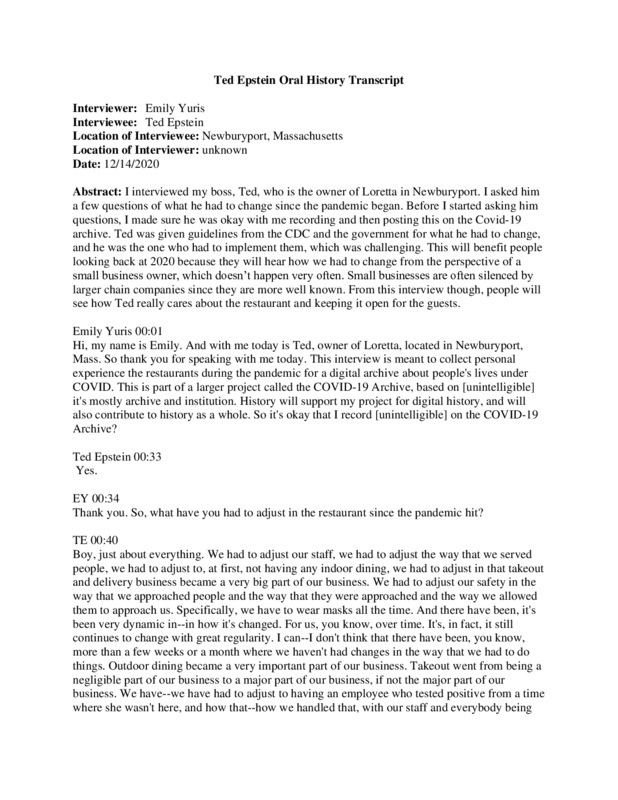 12/14/2020
12/14/2020Ted Epstein Oral History, 2020/12/14
I interviewed my boss, Ted, who is the owner of Loretta in Newburyport. I asked him a few questions of what he had to change since the pandemic began. Before I started asking him questions, I made sure he was okay with me recording and then posting this on the Covid-19 archive. Ted was given guidelines from the CDC and the government for what he had to change, and he was the one who had to implement them, which was challenging. This will benefit people looking back at 2020 because they will hear how we had to change from the perspective of a small business owner, which doesn’t happen very often. Small businesses are often silenced by larger chain companies since they are more well known. From this interview though, people will see how Ted really cares about the restaurant and keeping it open for the guests. -
 2020-12-14
2020-12-14Making the Best of Unexpected Situations
Carolyn is someone who has been dreaming about her 21st birthday and had big plans for celebrating it as well, however the pandemic forced her to cancel those plans. However, we still made the best of the situation. During this interview I asked Carolyn a couple questions that I needed to be careful with how I phrased them. I related this back to the things we learned about ethical archives. When figuring out what I was going to ask Carolyn, I was careful to think about what affect the question might have on her. I didn’t want to ask questions too harsh or questions that were accusatory. This definitely limited the questions that I could ask but I also think it was very helpful to think of it prior to the interview and make adjustments accordingly. -
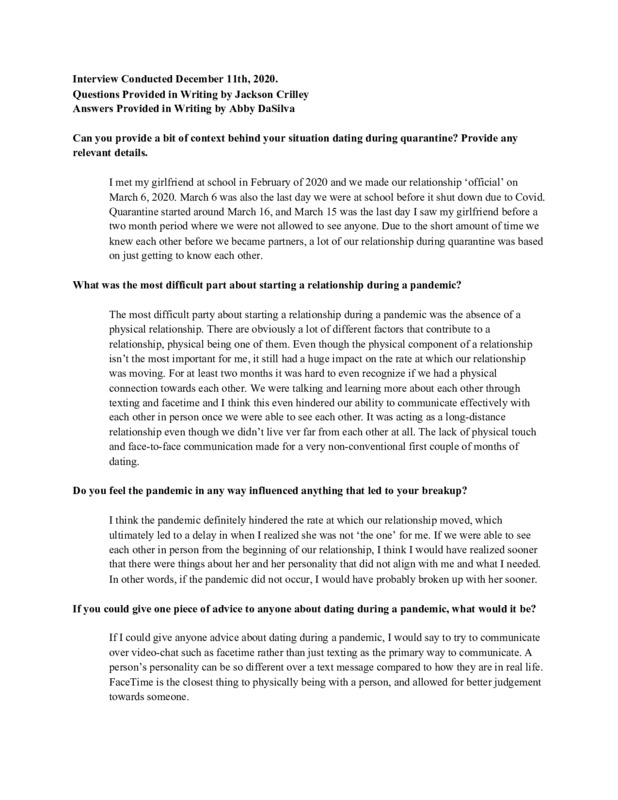 2020-12-10
2020-12-10How Does A Pandemic Affect The Progression of a Relationship? (Corrected)
This interview examines how a relationship between my close friend, Abby, and her girlfriend Julia was affected by the pandemic. As pointed out in her answers, they began dating right around the time that the pandemic began, and ended in early November, so the entire course of the relationship took place while the pandemic was going on. This interview represents individuals who are part of the LGBT community (Abby is bisexual, her ex-girlfriend Julia identifies as a lesbian), and gives the opportunity for them to share information about a relationship that may be looked over due to its lovers. -
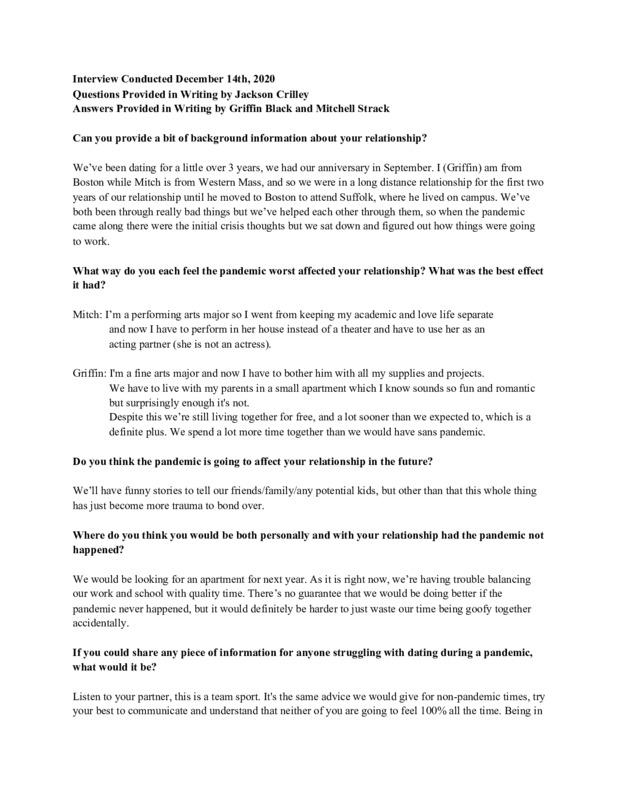 2020-12-14
2020-12-14What Effect Does A Pandemic Have On A Relationship? (Corrected)
As this interview is part of a collection exploring relationships and the exploration of sexuality during the Covid-19 pandemic, I really wanted to get to know some more about what it’s like to have a relationship altered by the pandemic. Luckily, I knew just the people. I reached out to two of my best friends on campus and asked if they’d be willing to speak about their experiences, which they agreed to. I already had an interview set up with a friend who went through a whole relationship (began dating and broke up) during the pandemic, but I felt it was important to explore multiple different types of relationships. This interview to me shows something about my generation living under Covid, as it shows how many of us felt like we were stripped of the indepence we gained when we left for college, and how we now have to navigate living at home again. In the case of these two, they also have to navigate being intimate and romantic with each other in this situation. -
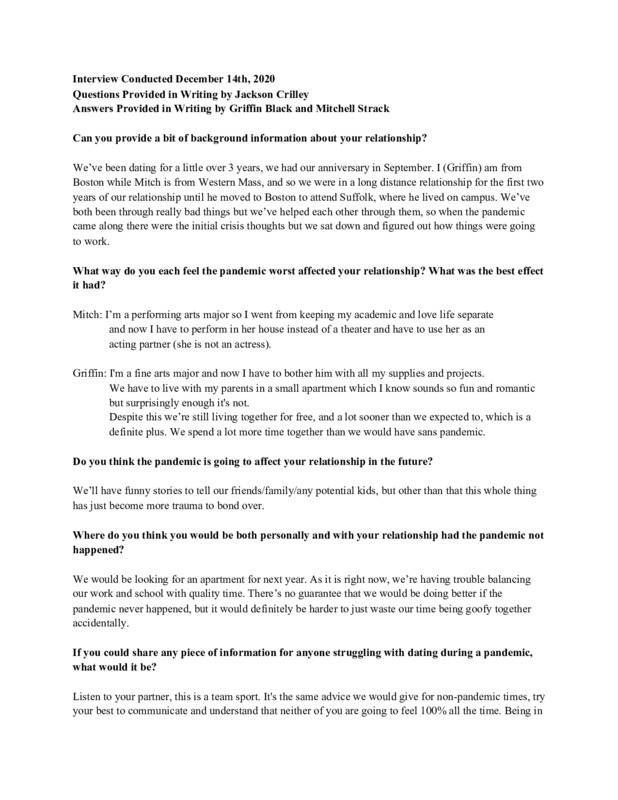 2020-12-13
2020-12-13What Effect Does A Pandemic Have On a Relationship?
As this interview is part of a collection exploring relationships and the exploration of sexuality during the Covid-19 pandemic, I really wanted to get to know some more about what it’s like to have a relationship altered by the pandemic. Luckily, I knew just the people. I reached out to two of my best friends on campus and asked if they’d be willing to speak about their experiences, which they agreed to. I already had an interview set up with a friend who went through a whole relationship (began dating and broke up) during the pandemic, but I felt it was important to explore multiple different types of relationships. This interview to me shows something about my generation living under Covid, as it shows how many of us felt like we were stripped of the indepence we gained when we left for college, and how we now have to navigate living at home again. In the case of these two, they also have to navigate being intimate and romantic with each other in this situation. -
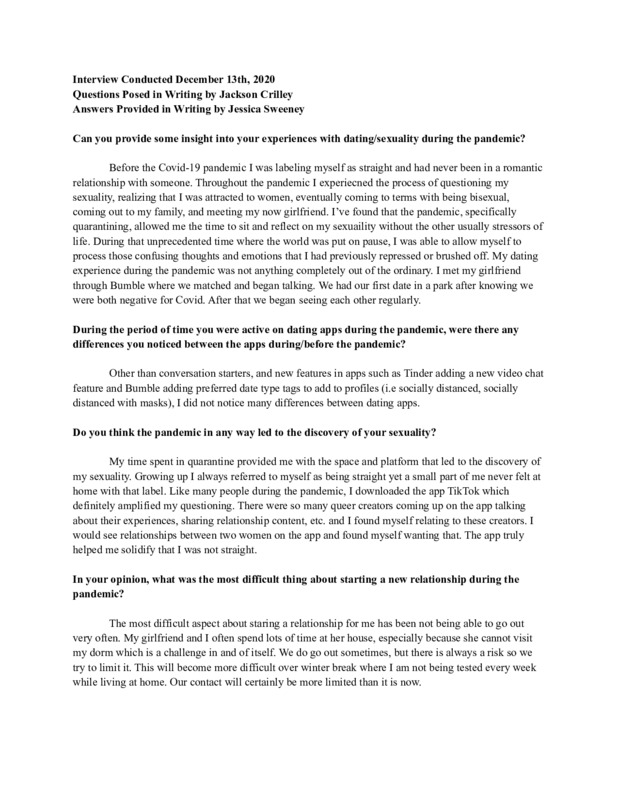 2020-12-13
2020-12-13How Does A Pandemic Help One Explore Sexuality?
In about September or October, I remember my friend reaching out to our group chat about how she was questioning her sexuality. This questioning soon led her to the realization that though she had identified as straight her whole life, she felt that the label of bisexual fit her better. Next thing I knew, she was dating a girl. When I decided to seek out material related to the expression of sexuality during the pandemic, I knew immediately that I wanted to dive deeper into her story and see if the pandemic had anything to do with the situation. One of the biggest issues I had with this interview was making sure that I was not overstepping any boundaries and getting too personal, going back to the ethical responsibility that historians/archivists have to respect the privacy of those who are aiding in their contribution. However, I feel that not only did I find more out about the effects of the pandemic, rather, I found more out about my friend than I had expected to. -
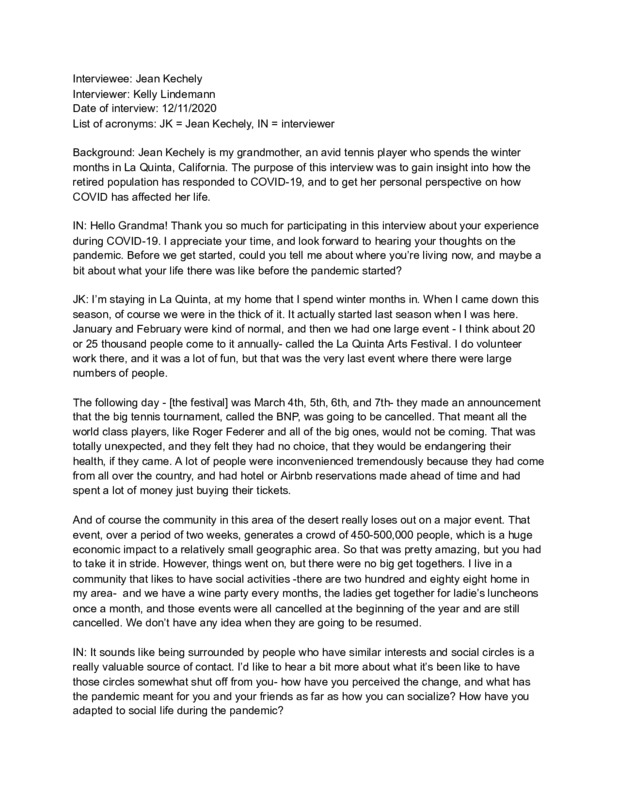 2020-12-11
2020-12-11Interview with Jean Kechely
Interviewee: Jean Kechely Interviewer: Kelly Lindemann Date of interview: 12/11/2020 List of acronyms: JK = Jean Kechely, IN = interviewer Background: Jean Kechely is my grandmother, an avid tennis player who spends the winter months in La Quinta, California. The purpose of this interview was to gain insight into how the retired population has responded to COVID-19, and to get her personal perspective on how COVID has affected her life. IN: Hello Grandma! Thank you so much for participating in this interview about your experience during COVID-19. I appreciate your time, and look forward to hearing your thoughts on the pandemic. Before we get started, could you tell me about where you’re living now, and maybe a bit about what your life there was like before the pandemic started? JK: I’m staying in La Quinta, at my home that I spend winter months in. When I came down this season, of course we were in the thick of it. It actually started last season when I was here. January and February were kind of normal, and then we had one large event - I think about 20 or 25 thousand people come to it annually- called the La Quinta Arts Festival. I do volunteer work there, and it was a lot of fun, but that was the very last event where there were large numbers of people. The following day - [the festival] was March 4th, 5th, 6th, and 7th- they made an announcement that the big tennis tournament, called the BNP, was going to be cancelled. That meant all the world class players, like Roger Federer and all of the big ones, would not be coming. That was totally unexpected, and they felt they had no choice, that they would be endangering their health, if they came. A lot of people were inconvenienced tremendously because they had come from all over the country, and had hotel or Airbnb reservations made ahead of time and had spent a lot of money just buying their tickets. And of course the community in this area of the desert really loses out on a major event. That event, over a period of two weeks, generates a crowd of 450-500,000 people, which is a huge economic impact to a relatively small geographic area. So that was pretty amazing, but you had to take it in stride. However, things went on, but there were no big get togethers. I live in a community that likes to have social activities -there are two hundred and eighty eight home in my area- and we have a wine party every months, the ladies get together for ladie’s luncheons once a month, and those events were all cancelled at the beginning of the year and are still cancelled. We don’t have any idea when they are going to be resumed. IN: It sounds like being surrounded by people who have similar interests and social circles is a really valuable source of contact. I’d like to hear a bit more about what it’s been like to have those circles somewhat shut off from you- how have you perceived the change, and what has the pandemic meant for you and your friends as far as how you can socialize? How have you adapted to social life during the pandemic? JK: Well actually, I would have to tell you that I feel very minimally impacted due to being a retired person and in excellent help, which enables me to engage in the normal activities that I enjoy, which I would describe as healthful recreation. I still play tennis three times a week, and my tennis club had to make a couple of changes. They require all of us members to wear a mask when we enter the property, but once we’re on the court and actually playing then we can remove our masks. Another big change was that we could not invite any guests to the club; that was something that we all enjoyed doing, but they felt that they couldn’t allow that. So, that’s how it still is right now. IN: As far as your companions in the club, are you all fairly like minded in your reactions, or are there differences in people’s opinion on how to respond to the virus? JK: Oh, there are many, many differences. Some people feel that they just don’t know what to believe about it. They don’t know what advice to follow, so anything that is actually mandated by the government, then we have to follow that to be good citizens. Several of the women with whom I play would have an adult child tell them “Well Mom, I don’t think you should be playing any longer because you have no control over where those people are going, or with whom they’re associating”. So, I’ve had a couple of players that I know stop playing, though now they’re back. There are a lot of people from Canada who are members of my tennis club. As soon as this started happening, I’d say around February, they left quickly to return to Canada because they were afraid that the borders would be closed down. This year almose none of them have come back, and the composition of our membership is greatly reduced and very changed. There is one Canadian couple who did fly down, quarantined for two weeks and had their car shipped down, which they’d never done before. Around here, a lot of the women are middle aged, fifty or older, and I am considerably older. Some of them didn’t even feel comfortable visiting each other’s homes, but some were so bored and needed socialization since they couldn’t do their regular activities that they were willing to go to somebody else’s house here in the neighborhood. I have a couple of friends who come over once a week to play Rummikub or Scrabble. One of my good friends has been volunteering for eleven years as an usher for the McCallum Theatre. They get top entertainment for very short runs, maybe only a weekend or an evening, but they have top entertainers like Rhonda Fleming, for example. She is dreadfully missing the wonderful entertainment that she got to see, and misses the people with whom she used to work as an usher. There’s still no idea of when they will be able to resume, since entertainment contracts like those are created at least a year ahead of time. That’s been a big loss for her to not have that. She’s someone who comes over and plays Rummikub or Scrabble with me. IN: It seems quite valuable to have a close circle of friends that you can get together with. Our social lives are very important and have a significant impact on our mental health. JK: And especially as you get older, they say that socialization is very important to help maintain your psychological health. I feel very fortunate that I can do this, and am very happy that there are some women in the area willing to go out and go to somebody else’s house. But I know there are a few who still don’t feel comfortable leaving their own homes, and it must be very difficult to them. IN: I’m interested in your perspective on the relative levels of safety and comfort that people have around protecting themselves from the virus. From what I’ve heard, the virus is more dangerous to people who are immunocompromised or older. I’ve seen a few submissions to the Journal of the Plague Year that center around older people who have a lot of apprehension of the virus, and many of them have taken drastic measures to protect themselves. As someone who is older, do you consider yourself to be vulnerable to COVID, and what is your attitude towards the virus? JK: Well age-wise of course I am vulnerable, but fortunately I do not have any underlying immune problems and am grateful for having such good health. I realize how difficult this pandemic has been for so many American families- parents are trying to keep an income stream, many of them have school-aged children at home and have to supervise their schoolwork, and try to keep the family engaged in outdoor activities. It’s almost too much to expect of a great many families, especially when it’s gone on since February or March and accompanied by harsh lockdown measures. A lot of people that I talk to are not certain that the advice they were given at the beginning [of the pandemic] has been accurate. They feel that a lot of the advice handed down by government bodies has been inaccurate. But you can’t blame them, since this is the first time such a thing has happened in our lifetimes, and everybody is having to go carefully and listen to what is advised. If you are a responsible person you listen to the advice, since these are the people who are in the NHI and the CDC and we should listen to what they think is best. A lot of people say, “We’ve been misled and don’t know what to believe”. I think with the mask thing there’s been a lot of resistance, and of course when you have your president so often appearing in public without his mask, that sends a poor message. I think that wearing a mask is a very small thing to ask of a person, whether it’s going to help other people or yourself- it’s such an easy thing and we should all be willing to do it. IN: I think so too, and on that note would like to bring up how the virus has been politicized, especially as it’s occurred during an election year, and how our governmental bodies have taken strategic stances on it. If you recall, back in March there were conflicting news articles about the subject of wearing a mask- some of then claimed that wearing one would increase your chances of getting it, or make it harder for medical workers to get the masks they needed. There was so much conflicting advice in the news, and I think that really impacted people’s perception of the virus and made it much harder to for them to know how to respond. Living in a community where people are from different areas and backgrounds must have given you an interesting view into the different ways that people perceive the virus. JK: I do hope that we can have this vaccine soon, but even with that there are many people who say that they won’t get the vaccine until its proven to be safe and effective. And I do understand that, but am glad that it will be made available first to healthcare workers and elderly people in nursing homes. IN: On that topic, some of the stories coming from nursing homes are heartbreaking, especially since they’ve had to be strict about limiting visitors. Living in isolation is hard for anyone, but living in a community away from your friends and family must make it a level of magnitude more difficult. JK: Oh yes. I have one of my friends whose husband is- was- in an Alzheimer’s care facility, and she would visit him every Tuesday and Thursday for over a year. When COVID-19 hit, the facility would not allow any visitors, even family. That was very hard for her, but they were able to arrange telephone and Zoom visits so she could actually see him. He passed away before I was abel to come down for the season, and I was very, very saddened for her. IN: The amount of suffering that people have had to endure is astonishing, and I hope that having a record of people’s experiences during the pandemic can help us to remember what people went through and maybe help us do better in the future. I sincerely appreciate that you’ve participated in this interview to share with the Journal of the Plague Year, and thank you so much for having this conversation with me. -
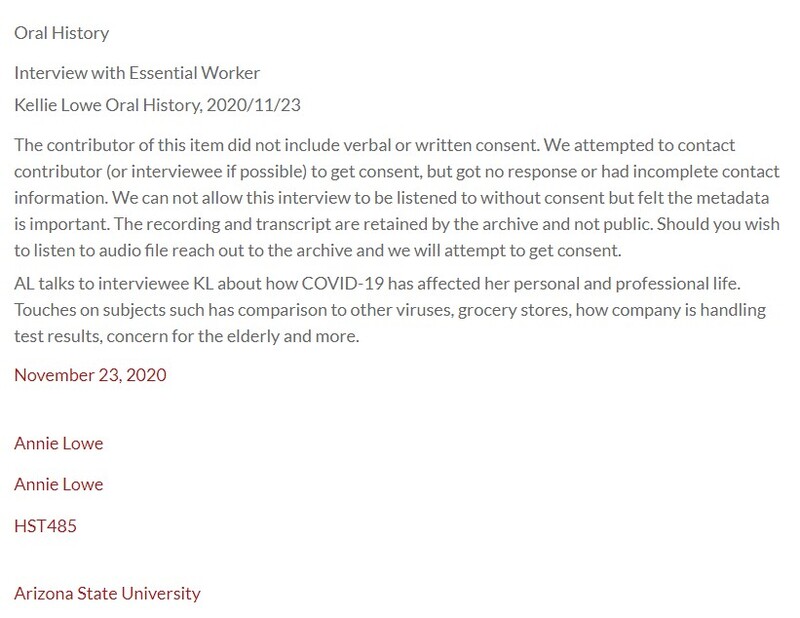 2020-11-23
2020-11-23Interview with Essential Worker
The contributor of this item did not include verbal or written consent. We attempted to contact contributor (or interviewee if possible) to get consent, but got no response or had incomplete contact information. We can not allow this interview to be listened to without consent but felt the metadata is important. The recording and transcript are retained by the archive and not public. Should you wish to listen to audio file reach out to the archive and we will attempt to get consent. -
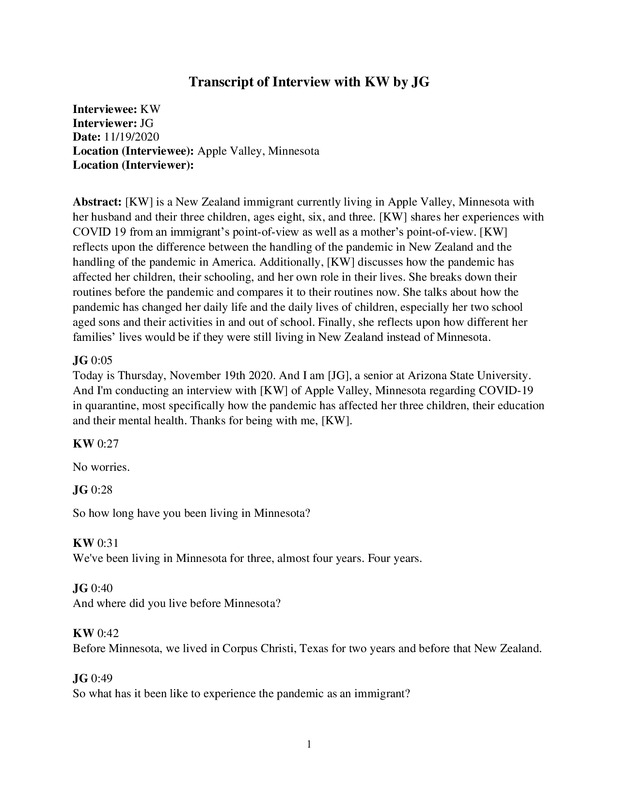 2020-11-17
2020-11-17KW Oral History, 2020/11/19
[KW] is a New Zealand immigrant currently living in Apple Valley, Minnesota with her husband and their three children, ages eight, six, and three. [KW] shares her experiences with COVID 19 from an immigrant’s point-of-view as well as a mother’s point-of-view. [KW] reflects upon the difference between the handling of the pandemic in New Zealand and the handling of the pandemic in America. Additionally, [KW] discusses how the pandemic has affected her children, their schooling, and her own role in their lives. She breaks down their routines before the pandemic and compares it to their routines now. She talks about how the pandemic has changed her daily life and the daily lives of children, especially her two school aged sons and their activities in and out of school. Finally, she reflects upon how different her families’ lives would be if they were still living in New Zealand instead of Minnesota. -
 2020-11-22
2020-11-22Interview with Brad and Christina Long: Restaurant and Food Industry
The contributor of this item did not include verbal or written consent. We attempted to contact contributor (or interviewee if possible) to get consent, but got no response or had incomplete contact information. We can not allow this interview to be listened to without consent but felt the metadata is important. The recording and transcript are retained by the archive and not public. Should you wish to listen to audio file reach out to the archive and we will attempt to get consent. -
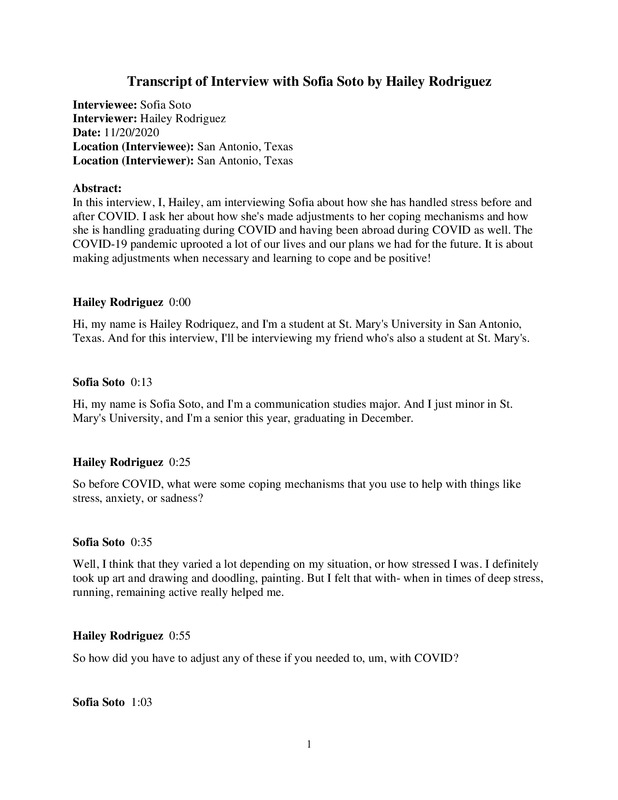 11/20/2020
11/20/2020Sofia Soto Oral History, 2020/11/20
In this interview, I, Hailey, am interviewing Sofia about how she has handled stress before and after COVID. I ask her about how she's made adjustments to her coping mechanisms and how she is handling graduating during COVID and having been abroad during COVID as well. The COVID-19 pandemic uprooted a lot of our lives and our plans we had for the future. It is about making adjustments when necessary and learning to cope and be positive! -
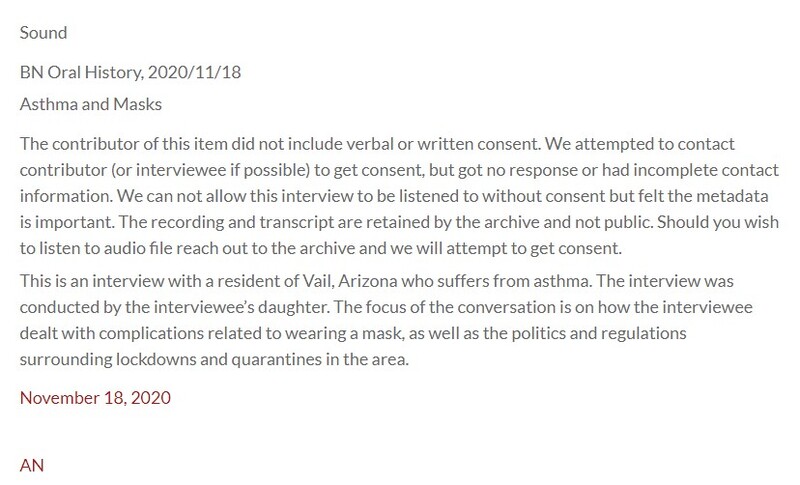 2020-11-18
2020-11-18BN Oral History, 2020/11/18
The contributor of this item did not include verbal or written consent. We attempted to contact contributor (or interviewee if possible) to get consent, but got no response or had incomplete contact information. We can not allow this interview to be listened to without consent but felt the metadata is important. The recording and transcript are retained by the archive and not public. Should you wish to listen to audio file reach out to the archive and we will attempt to get consent. -
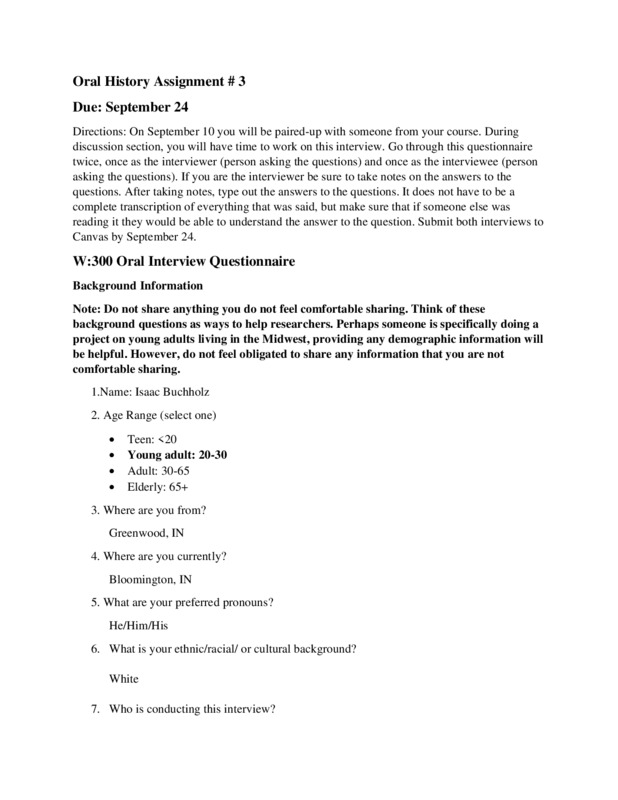 2020-09-10
2020-09-10HIST-W 300 Professor Peralta Student Interview
This was a project assigned by Professor peralta to better understand how we could interview a person about food and see how the COVID-19 virus has affected their relationship with it. -
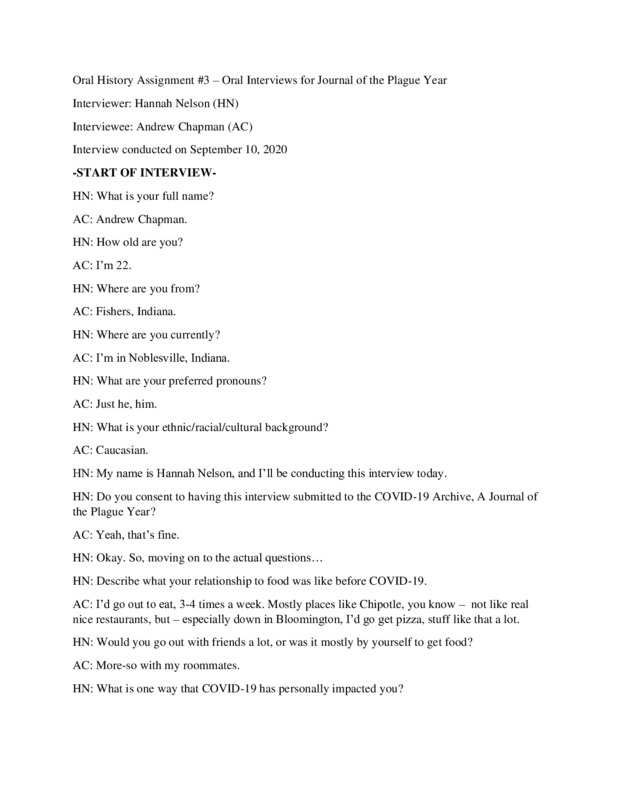 2020-09-10
2020-09-10Interview of Andrew Chapman
This is an interview I gave to a fellow classmate about his experiences with COVID-19 and how it has impacted his relationship with food. We both had very similar experiences, with Andrew telling me how COVID-19 and the subsequent quarantine we all had to go through led to him eating dinners more often with his family, and overall being able to spend more time together. I think this goes to show that as difficult as the pandemic has been, and as much as it has kept us apart from our loved ones in some cases, it has also brought other families even closer together. -
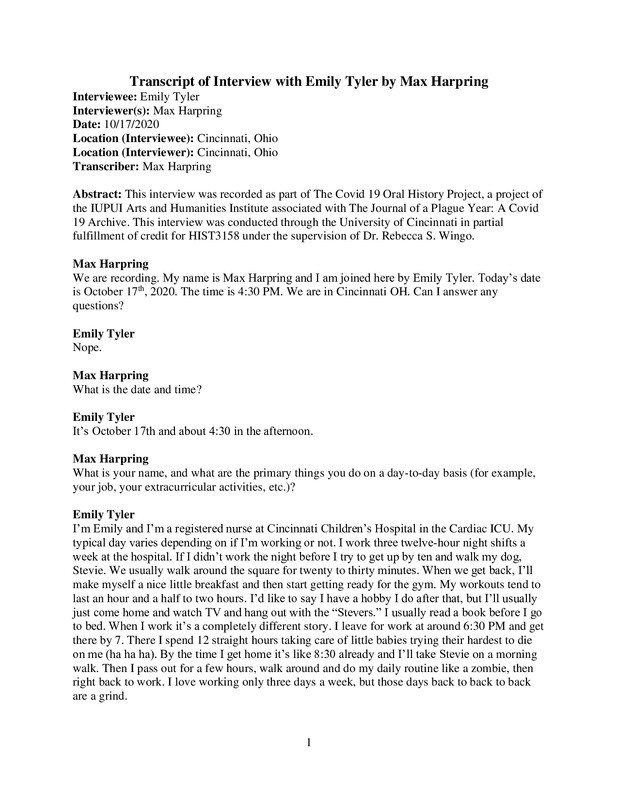 10/17/2020
10/17/2020Emily Tyler Oral History, 2020/10/17
Transcription only: In this oral history interview, I sat down and interviewed Emily with a range of topics including: her background, employment, family, household, community, health, information sources, government, and the future. This interview was conducted at Emily’s apartment in Cincinnati, Ohio. Informed Consent was obtained previously before the interview. -
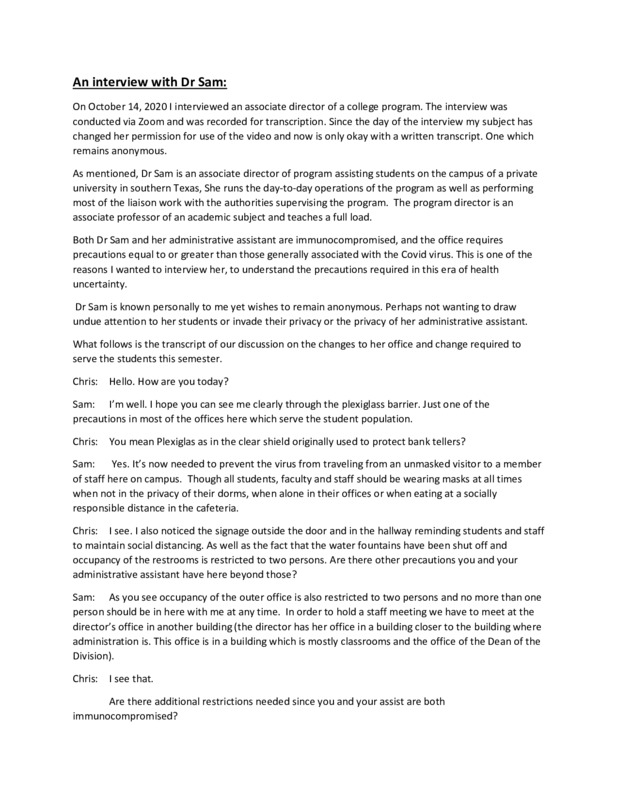 10/14/2020
10/14/2020Dr. Sam Oral History, 2020/10/14
An interview with an administrator about some of the adaptations needed to work in the pandemic. This like my other submissions is important because I am a member of the high risk group for the virus. Prevention of its spread is important to all of us. -
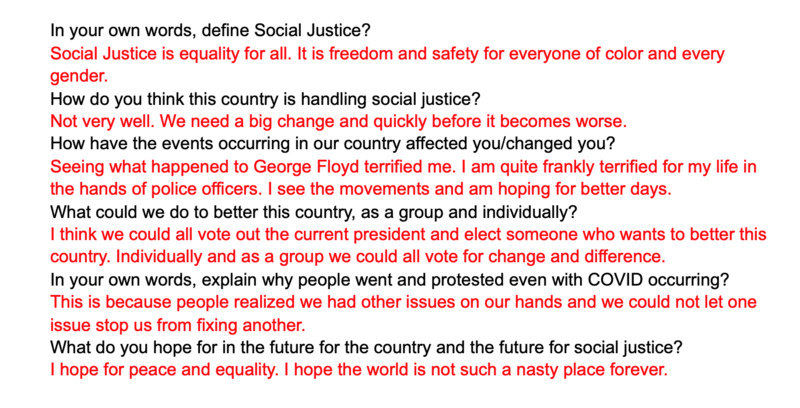 2020-10-28
2020-10-28How social justice is affecting POC
I interviewed my friend who has been affected by social justice issues that have been occurring in this country. He informed me how he has not been able to receive jobs he was overqualified for because of the color of his skin, how he has to fear driving by a police officer because of the color of his skin, and how he overall is not treated equally. He fully supports the movements going on in the country today and hopes for a better day. -
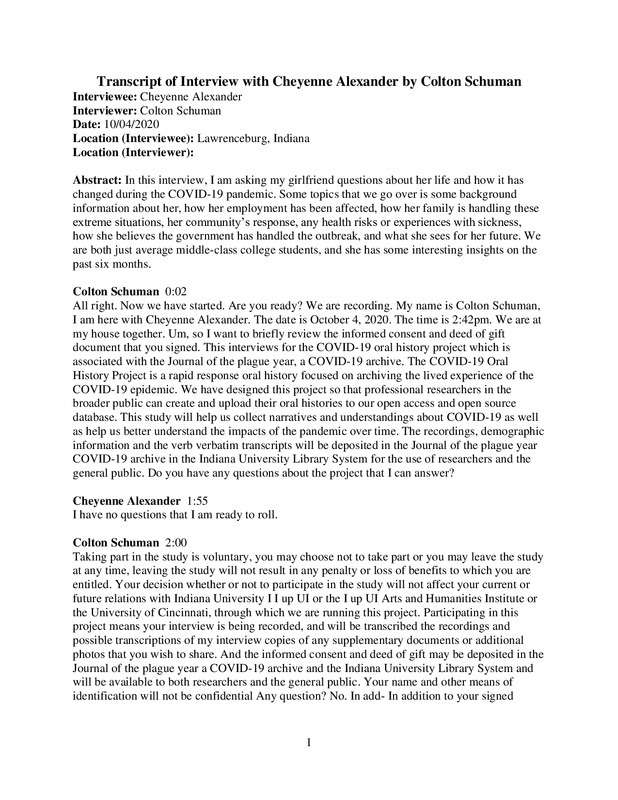 10/04/2020
10/04/2020Cheyenne Alexander Oral History, 2020/10/04
Transcript Only. In this interview, I am asking my girlfriend questions about her life and how it has changed during the COVID-19 pandemic. Some topics that we go over is some background information about her, how her employment has been affected, how her family is handling these extreme situations, her community’s response, any health risks or experiences with sickness, how she believes the government has handled the outbreak, and what she sees for her future. We are both just average middle-class college students, and she has some interesting insights on the past six months. -
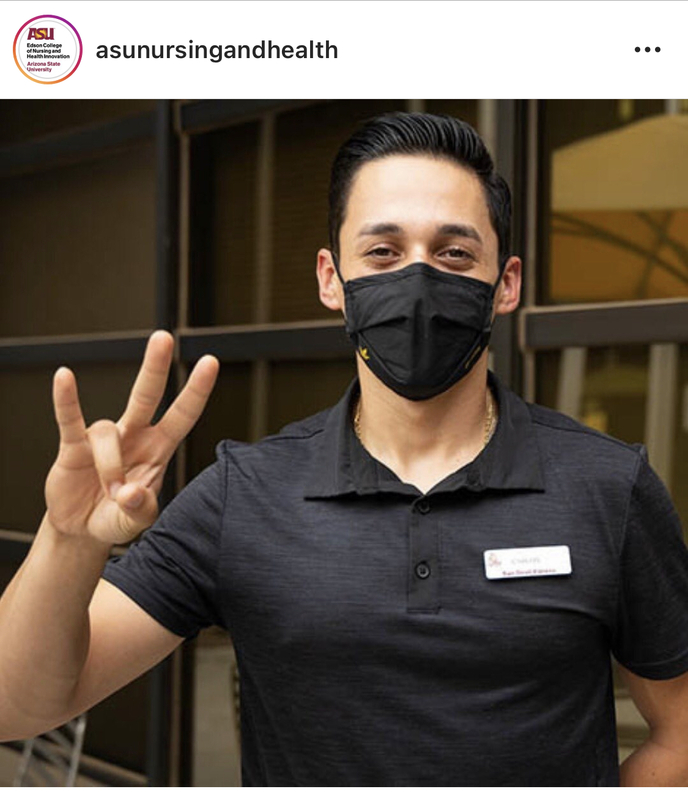 2020-09-15
2020-09-15ASU COVID-19 Interview Image
This picture is of me taken after an EOSS Social Roundup interview about my experience with school, work, and life during the COVID- 19 pandemic. This picture was also uploaded to the Arizona State University Edson College of Nursing and Health Innovation Instagram page (asunursingandhealth) and scholarship page. This interview will be incorporated to a video that will be shown to incoming first year students. The goal of this project was to clarify any questions that any future students may have and provide comfort to them through the firsthand experiences of multiple students at Arizona State University. Students were taken to various parts of the Downtown Phoenix Arizona State University campus and were asked questions pertaining to their involvement in campus, class, and how they incorporated safety measures while attending on campus. Personally, I was able to give detailed responses about how professors handled in- person classes and what measures they took to keep their physical students safe. I was also able to share my work experience at the university during this pandemic. I work at the university residential hall and Sun Devil Fitness and Wellness Complex. I was able to give a detailed description of how we, at my student jobs, have taken various measures to keep a safe and sanitary environment to keep our residents and patrons safe through this pandemic. My interview was also able to give an insight of living on campus during this academic year. I was able to answer questions about precautions that has been taken by university housing to keep their residents safe from this virus and reduce the potential spread. Overall, I hope that my insight given in this interview will put future incoming students at ease or encourage them to come to campus. All of this is to show the students that we are taking various safety measures to keep them at low risk and show them that they are in our best interest. -
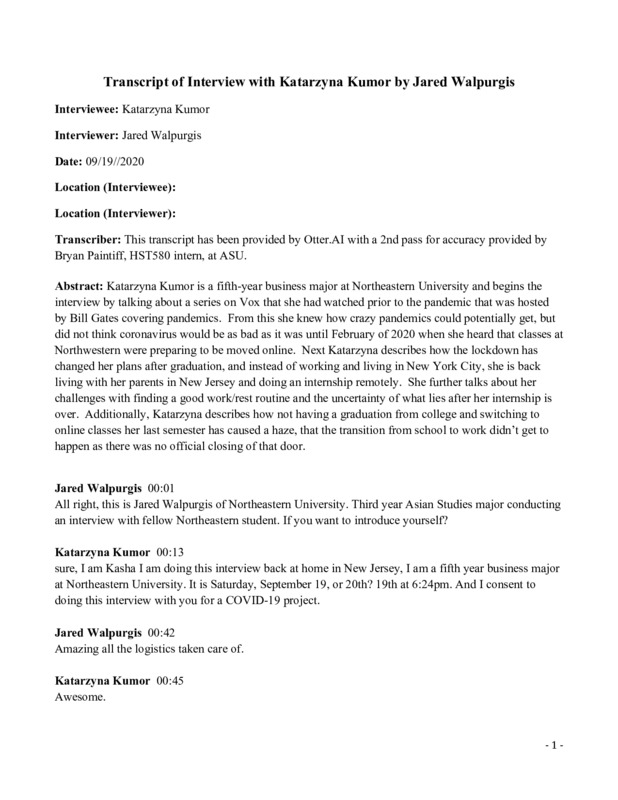 09/19/2020
09/19/2020Katarzyna Kumor Oral History, 2020/09/19
This interview was conducted and uploaded for the purposed of a class at Northeastern University centered around the study of pandemics. This interview goes a bit into the experiences of a college student during their last semester before graduation. It is focused largely on interning before graduation and transitioning from student to working adult. -
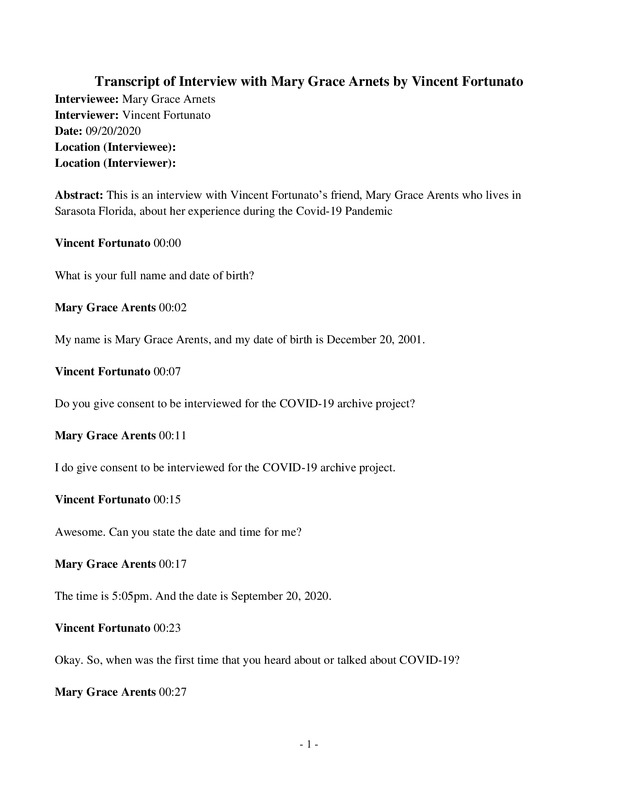 09/20/2020
09/20/2020Mary Grace Arents Oral History, 2020/09/20
This is an interview of my friend Grace who lives in Sarasota Florida, and her experience during the Covid-19 Pandemic -
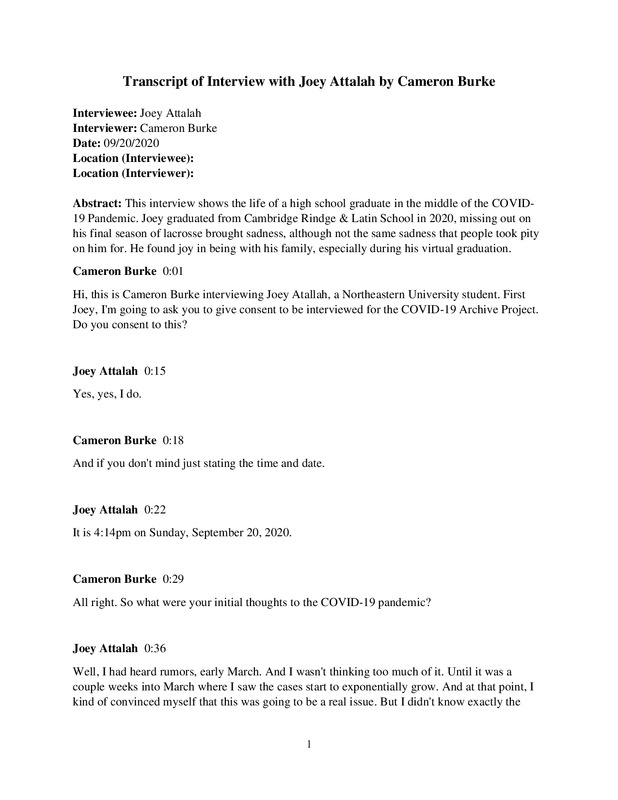 09/20/2020
09/20/2020Joey Attalah Oral History, 2020/09/20
This interview shows the life of a high school graduate in the middle of the COVID-19 Pandemic. Joey graduated from Cambridge Rindge & Latin School in 2020, missing out on his final season of lacrosse brought sadness, although not the same sadness that people took pity on him for. He found joy in being with his family, especially during his virtual graduation. -
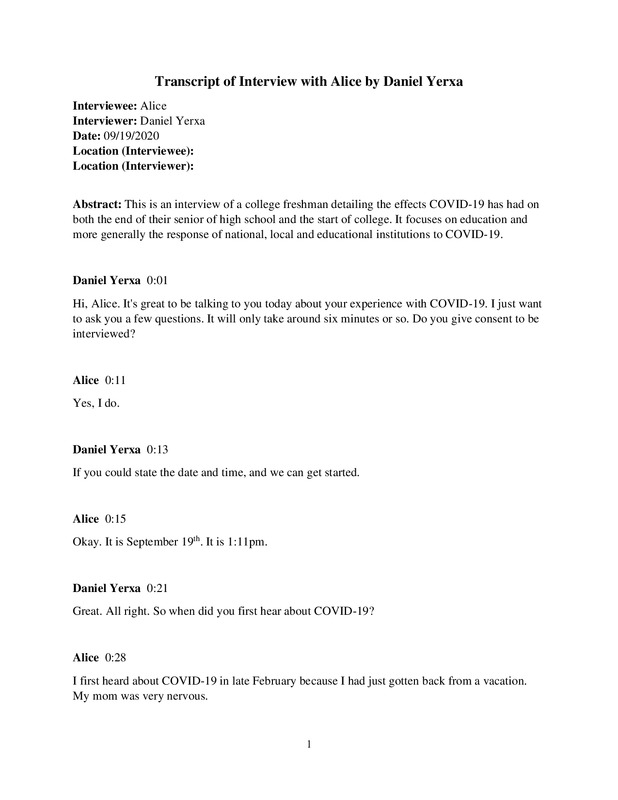 09/19/2020
09/19/2020Alice Oral History, 2020/09/19
This is an interview of a college freshman detailing the effects COVID-19 has had on both the end of their senior of high school and the start of college. It focuses on education and more generally the response of national, local and educational institutions to COVID-19. -
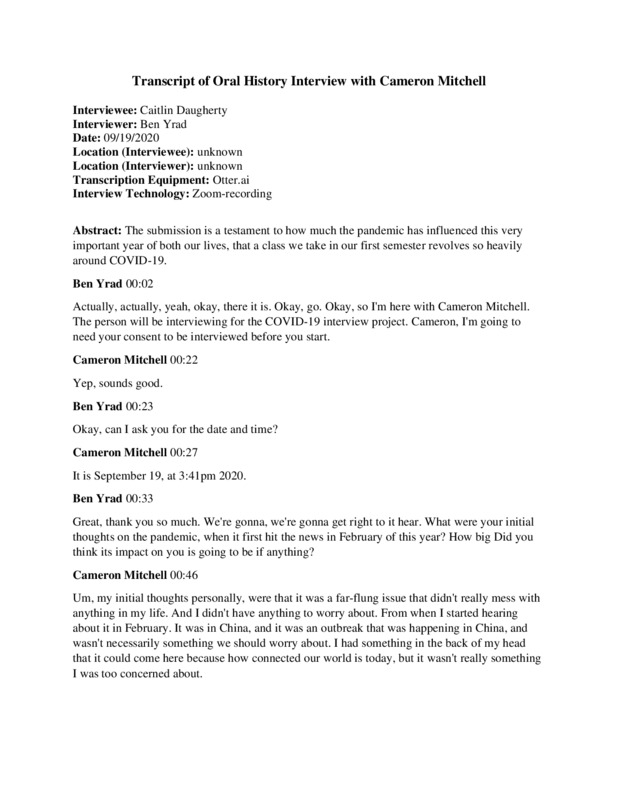 09/19/2020
09/19/2020Cameron Mitchell Oral History, 2020/09/19
The submission is a testament to how much the pandemic has influenced this very important year of both our lives, that a class we take in our first semester revolves so heavily around COVID-19. This is an audio file of my interview with fellow Northeastern University student Cameron Mitchell, for our History 1215 class. -
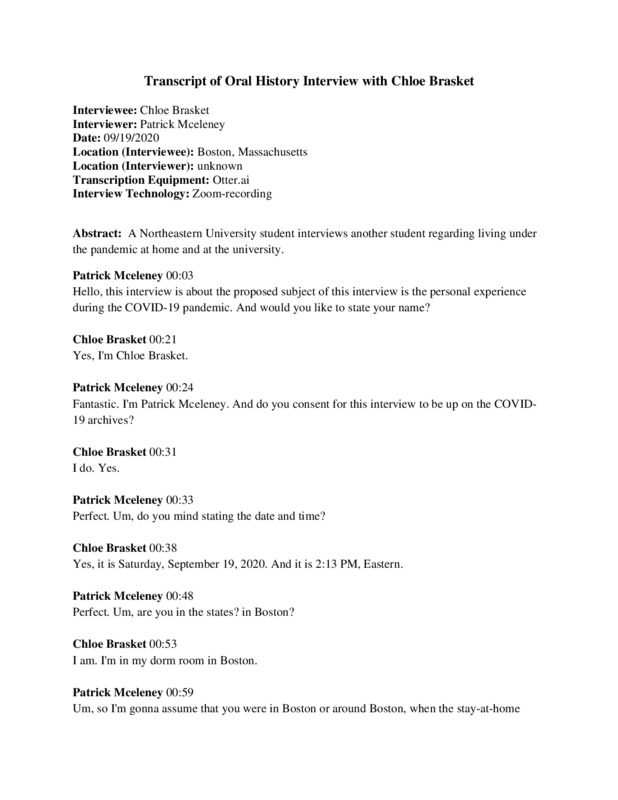 09/19/2020
09/19/2020Chloe Brasket Oral History, 2020/09/19
Documenting personal experience during the Covid-19 pandemic. A Northeastern University student interviews another student regarding living under the pandemic at home and at the university. -
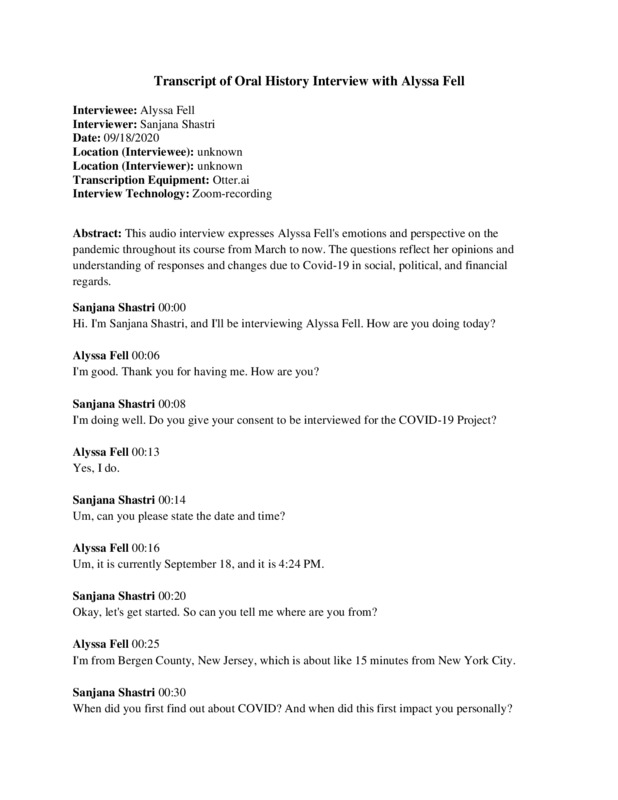 09/18/2020
09/18/2020Alyssa Fell Oral History, 2020/09/18
This audio interview expresses Alyssa Fell's emotions and perspective on the pandemic throughout its course from March to now. The questions reflect her opinions and understanding of responses and changes due to Covid-19 in social, political, and financial regards. -
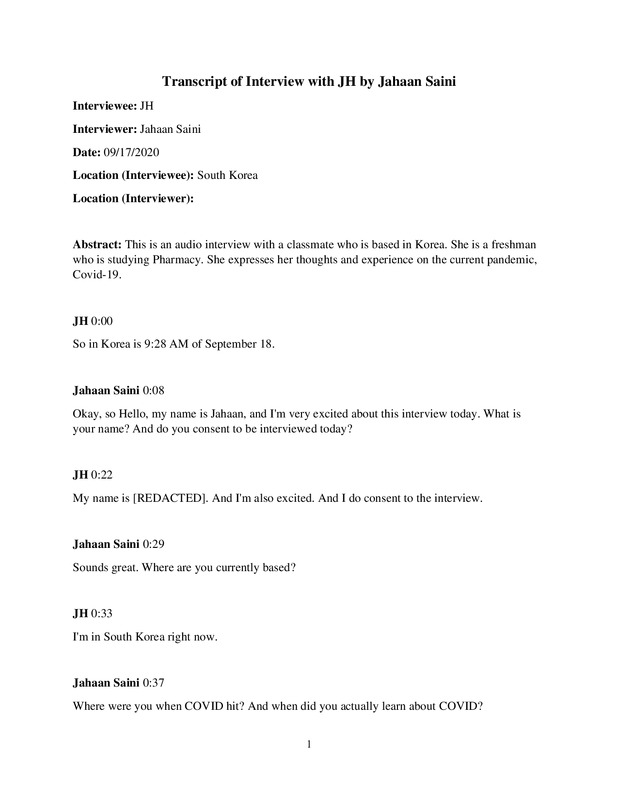 09/17/2020
09/17/2020[REDACTED] Han Oral History, 2020/09/17
This is an audio interview with a classmate who is based in Korea. She is a freshman who is studying Pharmacy. She expresses her thoughts and experience on the current pandemic, Covid-19.
